#and you would never know from that piece that he’s a gay filmmaker
Text
Ruby Gillman: Teenage Kraken
We’re getting a trailer for the movie in about a week.
Who made the movie?
The film, which had been made under the working title of Meet the Gillmans, is directed by Oscar-nominated filmmaker Kirk DeMicco (Vivo, The Croods, Space Chimps) and produced by Kelly Cooney Cilella (Bilby, Trolls World Tour). Faryn Pearl (storyboard artist on The Croods: A New Age, Trolls World Tour) is co-directing.
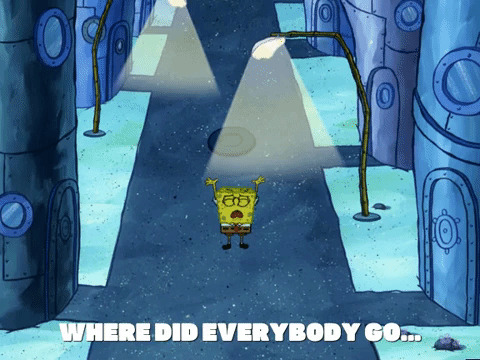
I know those movies aren't most populations favorites but I'll wait for the trailer. I expect it to be on a funny and silly side.
Voice cast:
Lana Condor (She was in those terrible To all the boys movies.), Toni Collette (I haven't seen anything she was in.), Annie Murphy (I haven't seen anything she was in.), Sam Richardson (A comedian actor who was in so unfunny productions like Velma and HouseBroken.), Liza Koshy ( I know nothing about her or her work.), Will Forte (Again, I know nothing about him or his work.), Colman Domingo (He's fine. I never watched anything he was in.), Jaboukie Young-White (He was in the Disney's Strange World as a token gay.), Blue Chapman (Blue is a trans boy who is best recognized for his role in the series Council of Dads where he plays a transgender character named JJ. By the way he's only 13 and was way younger when transitioning! I don't care if it's offensive to you. It is creepy and wrong!), Eduardo Franco (He's an actor known for his comedic roles and being in Stranger Things. I haven't seen anything he was in.), Ramona Young (I haven't seen anything she was in.), Echo Kellum (He's apparantly a comedian and was on Arrow. You know, that terrible CW show.), Nicole Byer (Unfunny comedian I've never heard before with a terrible book.), and Jane Fonda (The bitch who called for the murder of Pro-Lifers.).
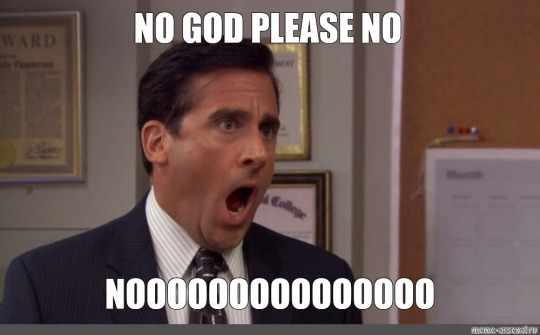
So what? The voice actors are their own individuals with their own opinions. Just because an actress is a piece of human garbage doesn't mean the whole company shares her views. And it's not like a movie will be talking about her political opinions.
It's a great opportunity to see if those people are any good. It's the script that matters! But the history of the cast isn't getting my hopes up or fill me with any excitement. As long as they'll say their lines and won't be too annoying it will be fine.
I want to say this. Even though I'm pro life and don't agree with transitioning kids who are way too young to know the consequences of their actions I would never call for murder or any harm for those people.
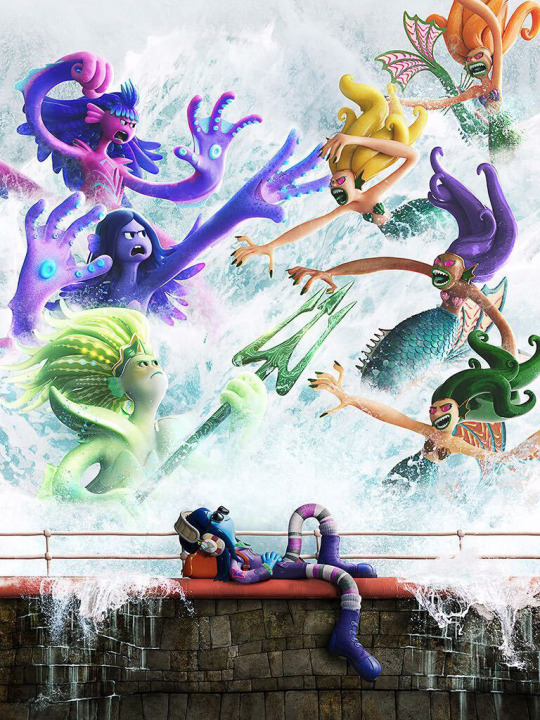
What's the story?
The story follows a shy 16-year-old named Ruby Gillman (Condor) who learns that she is the next in a legendary line of royal sea krakens. Despite her lofty destiny, all Ruby wants to do is fit in. At school, she falls for a skater-boy that she’s tutoring who shows no indication of feeling the same way about her. Ruby struggles even more to fit in because her mother (Collette) forbids her from going to the beach with any would-be friends. But when Ruby decides to disobey her mom’s instructions, she learns that she’s descended from the warrior kraken queens and will one day ascend to her grandmother’s throne (Fonda) as the Warrior Queen of the Seven Seas.
In the film, the krakens are a race sworn to protect the world’s oceans from the vain, power-hungry mermaids, and the two sides have been battling for eons. The generational confrontation comes to a head when a popular mermaid named Chelsea enrolls at Ruby’s school.
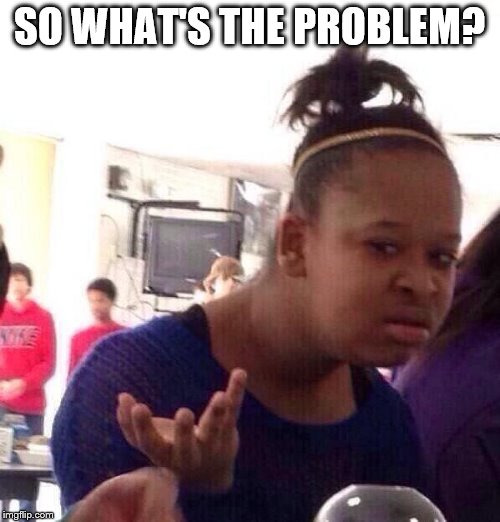
I really hope this movie won't go the ''Pretty girls are mean and superficial. I'm shy and not like the other girls. That boy just has to learn to not judge by the appearances.'' I believe that Dreamworks is better than that and will make great deconstruction of that trope. In The Croods New Age they had the chance to make stupid love triangle drama but didn't.
I'm worried about the lack of male characters. The plot only talks about female mermaids and queen krakens. No mention of males even in art. I hope it won't be the case that males don't transform because that would be such a waste.
Here is the link
https://www.cartoonbrew.com/feature-film/teenage-kraken-dreamworks-kirk-demicco-226970.html
I hope it's reliable. But if it's just some fun made think and I got played well I guess only time will tell. And if that's the case I will just make another post.
#Ruby Gillman: Teenage Kracken#Meet the Gillmans#dreamworks#dreamworks animation#ruby gillman teenage kraken
10 notes
·
View notes
Text
fullmetalbeansprout
replied to your link
“James Ivory's talent is timeless – why did it take the Oscars so long...”
Because he wasn’t wearing rad tchalamet shirt before ��
;-) This is amusing to think about because he made around 20 of his films (including the best-known/most successful) before Timmy was actually born.
Timmy is the latest in a very long line of actors to benefit from Ivory’s talent and (in his own films as director) his amazing taste in talent-spotting. I was going to list some of the names who were discovered, or got their first break, in Merchant and Ivory’s films, but there are so many: Thandie Newton, Christopher Walken, Helena Bonham Carter, Rupert Graves, Julian Sands, Daniel Day Lewis, James Wilby, Hugh Grant ... and Greta Scacchi, who Ivory really wanted to re-cast as Annella in CMBYN.
#fullmetalbeansprout#timothee chalamet#james ivory#merchant ivory#oscar winner#best adapted screenplay#call me by your name#oscars#2018#daily telegraph#the torygraph has a very narrow view of his career tbh#and you would never know from that piece that he’s a gay filmmaker
7 notes
·
View notes
Text
Mother Of Intervention - Film Review: Jonathan Agassi Saved My Life ★★★★
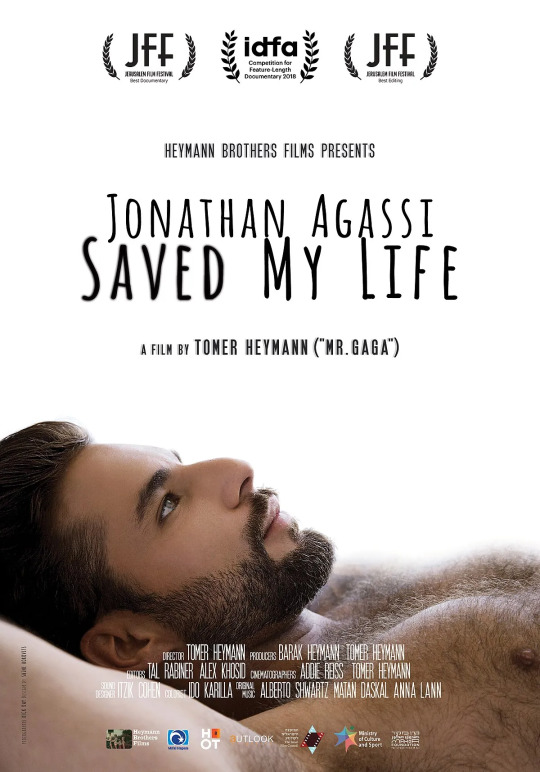
Many years ago, Israeli filmmaker Tower Heymann thought it would be a fluffy good time to follow around one of the world’s leading gay adult film stars in service of a sexy, funny documentary. Little did he know at the time that his years of filming his star, Jonathan Agassi, would instead result in something so raw, touching, and harrowing, yet also profoundly universal.
Agassi, born Yonatan Langer in Brooklyn in 1984 but grew up in Israel, took off like a rocket when he made one of the most popular films in gay adult industry history. When the film first meets up with him, he’s living the high life in Berlin, traveling the world for film shoots, winning awards, and allowing his alter ego to give him the confidence he lacked as a young child. We see behind the facade early on when he visits his mother and two siblings in Tel Aviv. His close bond with them, especially with his very supportive Mom, gives us a sense of his troubled upbringing, filled with bullying and an absent, homophobic father.
Agassi’s success, however, gives him his strut, his ease with gender fluid clothing, and his feelings of overall godlike sexiness. That effeminate little child doesn’t seem too far below the surface, nor does the damage and trauma he has carried around with him throughout his life. Agassi doesn’t shy away from using drugs, from cocaine to crystal meth, as his career soars.
One stunning moment occurs only 8 minutes into the documentary when Agassi, sitting down for an interview, a lit cigarette in his hand, nods off mid-speech. Agassi’s then boyfriend intervenes, carrying him to bed. I’m afraid at this point, Heymann realized we aren’t in Kansas anymore. It won’t be the last time we experience this. From here, we witness a person spiraling out of control. He soon loses a major adult studio contract and makes money as an escort, where drug use seems either rampant or necessary to get him through nights where he’s too tired to have sex.
Luckily, Agassi has a beautiful relationship with a mother who allows him to be his true self, despite some slight pushback from his brother and sister. Clearly, Mom can talk about anything with her son. She accompanies him on a shooting location in Greece, loves letting him model his lacy lingerie and high heels, and watches his films, well, at least the talky, pre-sex parts! Although she’s a fearless protector, she also has the self-awareness to recognize that their dynamic feels unnatural. She feels she should be supporting him financially and not the other way around. Although unspoken, she seems to sense that her son has been wrestling some demons, and instinctively creates a safe space for him. It’s the core of a film which could easily have been a god-worshipping puff piece, but instead feels instantly relatable to any kid who grew up being made to feel less than his fantastic self.
Agassi’s father enters the picture to further complicate the narrative. In an attempt to figure out what makes his Dad tick, Agassi questions him about his marriage to his Mom. This scene had me riveted, trying to decipher what were lies and what were truths. This change in perspective, however, adds another layer to the theme of surviving one’s childhood.
Through it all, Heymann rigorously and patiently waits for his moments. After what seems like decades of manipulated narratives in documentary filmmaking, this one feels not only authentic, but emotionally connected. It’s impossible to watch this beautiful film without being shocked, but more importantly, without feeling something. Anyone who has ever had that one solid person who gets you, who is there for you no matter what, will connect with Agassi’s perfectly imperfect mother. Furthermore, Agassi, who never seems to be playing it up for the cameras, risks it all with his brutally exposed persona, flaws and all laid bare for us to empathize. For those who want titillation, it’s there, although dialed back a bit from being explicit porn. Yet, this film, which deservedly won the Israeli version of the Academy Award for Best Documentary, proves there is so much more than meets the very sexy eyes.
2 notes
·
View notes
Note
(1/4)In one of your tags from the gifsets when Jamie walks into the kitchen and Dani first saw her! I just realized how oblivious until now with that narrative “how the au pair felt when she first saw the young woman” I was even oblivious with the way they look at each other. This is a romantic set up! To be honest, at first I thought they would not get along at first, and will come to parts where they’d start a fight one way or another.
(2/4)And then the part where Jamie asks Owen if he thinks Dani is pretty, the way Owen blushes I swear I thought that Owen and Dani were gonna be a couple!! Thanks goodness Owen answers he’s only got eyes for Hannah!! I mean, I started this show with a blank page without knowing if there’s any lgbtq character (I was hoping since we got Theo from HH)
(3/4)This says so much how we often, in media, being disappointed, being called too much as we read between the chemistry of any interaction of two same sex characters! And here’s in Bly, they set us up with that romantic first not-encounter encounter and we had to step back to see if this is intentional or we’re being reading too much again!
(4/4)And then nine episodes later, we got the most heart wrenching true love story of two women! Masterchef kisses!!! Thank you show! I was starting to root for Dani x Jamie interaction after their 1:1 with Jamie tries to calm Dani. What about you, what moment from the show that got you root for them?
So, here's the thing about me: I will always, always ship the ladies together in a show. And, like you said, I’m very accustomed to being let down when showrunners decide that in order for character to be queer, it has to be saying something. Like, they have an allotment of queerness they have to dole out. And to have a story coming in on the heels of a really successful show where we did have a queer character--and a really well fleshed-out one who never felt like she was gay for gay’s sake, but still, a character in the ensemble rather than The Lead--I felt like...in most other shows, that would have qualified as the “allotment”, as it were. “We already gave you Theo, what more could you ask for?”
So Dani turns up in this show and I think, “Okay, she’s a delightful Midwestern 80s girl with some real trials on her shoulders, she clearly lost someone, let’s see where this goes.” And I honestly didn’t think she was going to be anything onscreen, in terms of romantic story. I sort of assumed that if she had lost someone, the crux of her story was going to be about coping with that loss and moving on. Even when they introduced Owen, I didn’t think, “Oh, okay, here’s the romantic co-lead of the story”; they did a really excellent job of having both parties perform that car ride with platonic care. Like, we have the potential to get along really well, we’re likely going to bond, but there were no long camera shots of one watching the other, no sense that he was going to have interest in her or vice versa. They felt like instant friends. So, I thought, “Okay, cool, she could use some friends, she’s probably still going to just have this arc of coming to terms with losing this person.”
And I didn’t know who she’d lost yet, so I did think it could have been anyone. Brother. Father. Friend. I wasn't sure it would matter, I just figured that was going to be the focus.
And then Jamie walks in. And in retrospect, you’re right: this setup for romance was instant. The introduction, the narrator’s line, the way Dani looks up, the quick glance Jamie gives her before promptly pretending not to notice, all of these are textbook filmmaking tricks to Introduce The Love Interest. And Jamie, naturally, is styled like a classic lesbian in every way, so I thought, “Huh. That’s interesting. But they already gave us Theo last time, so...”
Which is deeply unfair. It’s unfair to the creative team, it’s unfair to the story, it’s unfair to me as a viewer, to have that knee-jerk assumption on my shoulders. And I like to think that Bly surprising me as it did will help me not make that I’ve been burned assumption in the future, because...we really have come a long way. But even so, on this first watch, I thought, “That’s interesting. I could ship it. But I don’t think that's the story they’re going to tell”, because I didn’t yet trust the creative team to prioritize queer relationships on the same level as straight ones.
Things continue, and we get all the little clues that, in retrospect, are huge: Jamie thinks Dani is “too pretty” and quite frankly can’t shut up about her. Dani physically brightens when Jamie’s in the room. Jamie reassures Dani that she’s doing well, and does so with the gentlest nudge at flirtation, and Dani swivels her whole body to follow Jamie as she leaves, making sure to catch every last glimpse she can before Jamie disappears into the house. And we’re getting these clues from other characters, too, in the way the kids exchange that look when Jamie’s first introduced, in the way Owen constantly looks to Hannah with every indication that he’s not kidding in the least when he says he only has eyes for her. But I still wasn’t...sure I could trust it.
Which is silly. Because there is nothing, not a single thing, that is subtle about this love story. The music cues, the camera work, the angling of the actresses toward one another in every scene they share. The way Pedretti makes certain Dani looks the easiest in her body and in her smile when it’s Jamie making her laugh. It’s so intentional all the way down, like the entire team was saying, “Here. This is important. This is valuable. And we absolutely refuse to let anyone watch this show and say, oh, we didn’t feel it. It came out of nowhere. Couldn’t they just have been friends?”
Episode 3 went a long way to hammering it home, of course. Between the conversation on the couch about love and possession, where the silence between them stretches on with a sort of comfortable heat, and the way Dani looks at her--and the camera looks at her--when Jamie is asleep on the couch, and that final moment with the hand grab, I realized they were really going for this thing. And obviously by Episode 4, you’re supposed to know what’s up. The gloves are off, the story is fully tilted in this direction, and I think it was around this point that I started to realize who the narrator probably was. Originally, I think I thought she’d be a very grown up Flora; once I realized Jamie was in fact the Romantic Lead of the piece, I went, “Oh. Ohhhh. Oh shit.”
The moral of the story here is, I trust this team now. I trust them to prioritize queer love with just as much “this is normal, guys, get over it” care as straight relationships. And, frankly, it makes me re-evaluate my opinion of the sexuality tackled in Hill House. The first few times I watched that show, I thought, “God, it’s nice that they gave us Theo. She’s flawed, she’s human, she’s funny, and her being gay is non-negotiable.” Now? Now I watch it and think all of that while also thinking, “You know what? Luke could be queer. His response to Joey all the way through really reads more like a friend who wants to help, with nervous confusion in the event that she nudges too close.” And especially after that interview where Victoria Pedretti said she always assumed Nell was queer, and that her ending up with a man didn’t negate that, it just wasn’t really relevant to parse it all out onscreen, I thought, “You know what? She’s right. There is absolutely nothing stopping that from being true.” And that’s how I’ve approached all media since I was a teenager, fair, but the difference is it feels...like these shows agree. That this is why they didn’t announce the LGBT rep ahead of time. That it’s not gonna be “gay for gay’s sake”, that it’s not going to be for drama or to cause a ruckus, but that these stories say, “Hey. This is a real thing. Love looks like this, too. Here: watch this beautiful, poignant, heartbreaking story of two women who love each other more than anything in the world. Watch it, and understand that they are so normal, and that them being gay changes nothing about how they live out their story together.” And I love that.
#the haunting of bly manor#the haunting of bly manor spoilers#the haunting of meta#dani x jamie#have I ever answered a question with a paragraph when I could write an essay? nope!#but genuinely I am so pleased that this was handled in this way#no fuss. no tease. just people saying 'this is the story we're telling and they happen to both be women and that is beautiful'#I love a show that makes me feel silly for NOT believing off the bat it's going to be queer#because I'm so used to shows doing the exact opposite#and telling us we're insane for reading chemistry between two women or two men or nonbinary characters or whatever else#this is so refreshing to have the opposite happen#and to never once feel like they were afraid of what it would look like
129 notes
·
View notes
Text
confession time: for someone who (semi) actively runs a movie blog, i really haven’t seen a lot of classic movies.
(i know this comes as a shock for those of y’all who have been subjected to nothing but my half-baked thoughtpieces on bad 80′s horror for the past couple of years, but bear with me.)
to be honest, even this review doesn’t REALLY represent me making an active choice to remedy that so much as it does me pulling a long con where i endear myself to marilyn monroe by watching her movies to get myself excited to watch the miniseries blonde (2001), for abnormally pretty, young jensen ackles purposes*, but let’s not dwell on all that. the practical result is the same; i watched some like it hot (1959). now, i hope y’all are ready for a few some like it Thoughts™:
first, idk how much attention y’all have been paying to the loose bits of personal lore i occasionally scatter within my reviews, but one thing about myself that i feel i’ve been pretty open about is the fact that i’m trans. this being so, and knowing not a whole lot about the movie beyond the very basic premise “1959 extended man in a dress gag,” i can’t say i went in with the highest of expectations. imagine my surprise, then, when the gender aspect of this movie was... actually pretty good? i mean, full disclosure, it’s not exactly gender studies, but it’s passable! it’s tolerable! there were even a few moments where i felt inclined to say the words “oh, GENDER?” out loud!
perhaps most impressively, i’d say the Cis Creator Cringe Factor of some like it hot was actually impressively LOWER than a lot of modern moves with genderswapping premises tend to be. like, i know that one definite explanation for that would be the fact that trans experiences are more widespread today, so modern filmmakers don’t feel comfortable playing with ideas like this without at least giving lipservice to them, while the era that bore some like it hot didn’t face the same “pressure,” but, okay. listen. compared to another movie i watched recently--freaky (2020), in which a teenage girl swaps bodies with serial killer vince vaugn, featuring one incredibly anvilicious scene where, upon being informed by a gay boy that she’s in the men’s bathroom, the girl’s best friend retorts, “she [vince vaugn]’s got a dick in her hand, and you’re wearing chanel no. 5. i think we’re past labels.”--some like it hot, a movie older than my father, was wayyyy easier to watch**. actually, you know what? yeah. listen to me. cis content creators? movie producers? i’m talking to you. DON’T EVEN BRING GENDER (or gender “identities”... which is an incredibly gross term, anyway) UP IF YOU’RE NOT PLANNING TO DO SOMETHING WITH IT. sincerely, this particular bad taste corner of the trans community :).
...anyway.
some like it hot, by contrast, did it right. YES, the premise of the movie was two presumably cis men in disguise as women. i’ll put that in the open. however, there was a certain... i don’t know if “respect” is the right word, but there was an avoidance, at least, of the usual predatory tropes. in fact, the worst behavior by far from either main character comes when joe manages to take off his female disguise, donning another, male persona and using things that sugar (marilyn’s character) confided in “josephine” to create a nonthreatening, desirable “millionaire” in order to trick her into sex. okay, like i said, it’s not gender studies, but, the humor in some like it hot comes from generally the right place. joe and jerry don their female disguises in a matter that in quite literally life and death for them (and it’s more than the creators ever thought of, i’m sure, but there IS an interesting analysis to be had of them needing to pass to live), which to a degree removes the usual pitfalls of male to female crossdressing as a gag; they’re neither doing it for lecherous reasons, nor to parody the female experience. this being a comedy, there is a degree of humor found in the situation, but it’s directed at jerry and joe, the characters, more than their disguises. the general assumption is that they both pass without question, as long as they’re wearing their ladies’ clothes; jerry once comments that he’s “not even pretty,” but it’s never an issue to contend with.
wrt the crossdressing, the worst moment for me, personally, was a scene on the train when jerry prepared to take off the disguise in order to sleep with sugar, and even this ends up comedically averted at jerry’s expense.
and speaking of jerry.
jerry is actually the most compelling part of the movie for me, especially viewing it through the lens of gender. while joe, who gets the girl and manages to spend large chunks of the latter part of the film in his second, male disguise, never thinks too much about what they’re doing beyond the survival aspect of it, jerry is the one who, erm, “gets into character.” joe’s female name is simply josephine; before they get on the train with the woman musicians, it’s assumed that jerry will be going by “geraldine.” however, when they give their introductions, the duo becomes josephine... and daphne.
as the movie progresses, this distinction grows more pronounced; when joe has to remind a smitten jerry on the train that he’s a girl, referring to their disguises, jerry miserably repeats the affirmation: “i’m a girl. i’m a girl. i want to die. i’m a girl.” later on, however, as joe’s relationship with sugar develops, “daphne” becomes acquainted with local horndog millionaire osgood, who he at first dislikes, but comes around to after being forced on a date as part of joe’s plan to trick sugar. after seeing jerry excited by the prospect of marrying osgood, a bewildered joe has to remind jerry why it’s an impossibility, and in the same miserable tone as before, jerry/daphne muddles through a new affirmation, one that definitely didn’t ring false to my trans ears: “i’m a boy. i’m a boy. i want to die. i’m a boy.”
hm. actually, now i’m thinking about a trans male reading of joe. he was the one at first resistant to taking the job (with the all-female band), when they only needed money, and not a place to hide from an upset mob boss, but also the one who seems to know more about the role when it comes time to get into character. while jerrydaphne gets increasingly comfortable with femininity as time passes, joe never performs it in anything but a perfunctory, necessary way, and sloughs the costume EVEN WHEN the danger of being found out has not yet passed, because pretending for such a long period of time is just untenable. something about passing for female being a safe haven and a burden for both closeted (re-closeted, in this case) trans men and out trans women?
anyway. by the end, though both osgood and sugar do find out the truth about the disguises, sugar seems to instantly forgive joe for his treacherousness (again, referring more to his actions as the shell millionaire than his escapade in drag), while osgood appears unbothered by daphne’s truth, leading to an ambiguous ending for the futures of the characters, and any realizations that might come later.
no, it’s not the “real transgender experience.” it (thankfully) never claims to be. BUT, being trans myself, there were some moments that made me feel linked to our protagonists, and relatively few, if any, that made me feel alienated. all in all, that’s a lot more than i hoped for going in, so that’s what i’m happy with.
watch some like it hot, y’all. it’s a good movie in a timeless way, and, as modern movies appealing to short-lived trends that will feel outdated next week (if not by the very time of their release) will show you, that’s more than it needed to be.
*since my original draft of this post, i DID watch blonde, and i don’t know if that’s technically fair game for this blog (not exactly a movie) or what, but 6/10. fairly well done piece of art but just BEATINGLY tragic, so proceed with caution. jensen ackles literally is THAT PRETTY though, so the jackles cut i give a strong 11/10. i am a homosexual.
**i would like to clarify that this isn’t me telling you not to watch freaky. yes, some of the dialogue is tragically riverdaleian, but there’s also a scene where vince vaugn makes out with a teenage boy. so,
17 notes
·
View notes
Text
Netflix’s Hollywood (2020) Review

It may be set in the same day and age as Tarantino’s Once Upon a Time in Hollywood, but it’s nothing alike. This is a different kind of Hollywood...
Plot: In post-World War II Hollywood, aspiring actors and filmmakers will do almost anything to make their showbiz dreams come true.
The racism was indeed a serious issue back in the Golden era of Hollywood, with not just people of colour being mistreated and disregarded. Recently I’ve been re-watching Bruce Lee films and the guy is such a talent, yet it took him a long while to get properly recognised in Hollywood. Yes, he was helping out in stunt-work and was training actors to be able to perform certain fight sequences, but it took him a lot of time and work to become beloved and popular by himself that Hollywood studio Warner Bros. had no choice but to finally allow him to make his own picture with a decent budget, and that was 1973′s Enter the Dragon, which unfortunately was his final completed film before his untimely passing, but even so, after such a long fight against the discriminating and racist nature of the film industry, he actually managed to achieve his dream. No wonder that in 2004 Enter the Dragon was selected for preservation in the US National Film Registry by the Library of Congress for its cultural significance. Again, that’s why I was upset with how Quentin Tarantino presented Bruce Lee as a narcissistic a-hole in last year’s Once Upon a Time in Hollywood, as its such mistreatment and disrespect to an icon that helped progress and shape Hollywood in a better direction. Now, Netflix’s new series, conveniently titled Hollywood, is also about the Golden Age of Hollywood where non-white people had no rights or proper opportunities to get themselves out there, due to the expectations of the audience and fear of the likes of the Ku Klux Klan bringing their terror regimes, and the series presents an alternate time-line where these group of individuals succeed in making a movie that at that time would have been impossible to make. So, is the series as good as its potential-filled premise?
The series is brought to us by Ryan Murphy who most will know from his work on TV shows Glee and American Horror Story, and whilst I myself am not that well acquainted with those, I have seen his last year’s Netflix show The Politician, which I enjoyed for its blend of the campy whimsy intertwined with the political reality of the United States, and am very much looking forward to its next season, whenever that may be. With Hollywood, Murphy tries to take the present and put in the past, by seeing how today’s inspirational movements would have worked back then. He brings his distinct slick, sensational style to the Golden Age of showbiz. Bawdy and transgressive, it starts with a flair and energy that’s hard to look away from, tremendously watchable from minute one. And there is a lot going on in these 7 episodes, one can even say too much. Here’s the thing, Hollywood, tries to correct, well, Hollywood, by rewriting the well-worn dream big story, but one starring people who weren’t allowed to be a part of it, and one where they win. It’s also about the idea of a ‘Dreamland’, where big-name stars had hookups arranged by fixers that conducted business out of a gas station front and secretly gay and bisexual actors and producers threw exclusive parties where they could be secrets no longer. Hollywood is shown for its ugliness - the homophobia, racism, and sexism that shut out marginalised talent for decades. Thus there are lots of characters and plot-lines in this series, and because of all the stuff going on, the entire thing does come of a bit all over-the-place. In fact, the show doesn’t really find it’s proper footing until episode four, where our characters finally come together to make this fictional film called Meg, and when this kicks off, then the show does arise to the occasion and becomes humongously enjoyable and interesting to watch.
There’s a lot to truly enjoy in this series. From the immaculate production design to some truly juicy pieces of dialogue, which is good, since the series is about making a movie and every movie should have juicy dialogue! Also, this thing is really well cast, with a mix of newcomers and stars that you might have seen in other films/shows previously. Whether its Jim Parsons like you’ve never seen him before, being impressively nasty and slimy as a Harvey Weinstein-type of that era, or Samara Weaving continuing her foray by dashing us on the screen with her glamour and talent (though I should point out she was heavily under-used), or Dylan McDermott bringing his usual cool voguish persona however also exemplifying some surprising emotional levels, or Jeremy Pope bringing dramatic gravitas to every scene that he is in, or Joe Mantello as a studio producer with more to him than meets the eye.....I can go on. There isn’t a weak link in the cast, everyone is bringing their A-game and some even deliver career-best performances! Because of the cast, you fall for these characters so much that you truly do want to see them all succeed, so when the final episode, appropriately titled Hollywood Ending, arrives, even though its overly glossy by being just too good to be true (and may even present this thing as a bit of a puff piece), typical to an actual Hollywood ending, it feels garnered.
Hollywood at times takes on a bit more than it can chew, and it can come off overly preachy, even for its own good, but there is a lot to enjoy in this thing. I would say, I was surprised by the amount of sex/nude scenes and would have preferred less, but that’s a personal gripe more than anything. That being said, I get why it was done, as it was made to be uncomfortable to underline the darker side of show business. Then again, for all of its attempts at being dark, Hollywood also lacks conflict. All the problems that the characters face are dealt with ease in a matter of minutes. For example, at the end of one of the episodes we are left at a cliffhanger when the entire Meg film-tape is burned by a bunch of stereotypically-evil lawyers. However, in the opening minutes of the following episode its revealed that someone secretly made another copy of that film-tape beforehand, so that little tiny problem comes and goes as if it was nothing. That goes for the show as a whole. There are a lot of barriers that our characters come across, but they jump over them with but a scratch if that and thus diminish any kind of threat, stake or element of urgency. That being said, I really enjoyed Hollywood, and though it is not perfect, it’s definitely the best thing Netflix has released so far this year!
Overall score: 7/10

#hollywood#hollywood netflix#hollywood review#hollywood netflix review#2020#tv show#streaming#netflix#ryan murphy#ian brennan#david corenswet#darren criss#jim parsons#samara weaving#laura harrier#joe mantello#jeremy pope#dylan mcdermott#patti lupone#jake picking#holland taylor#queen latifah#hollywood series#hollywood ending#showbizz#drama#comedy#alternate reality#golden age of hollywood#mira sorvino
41 notes
·
View notes
Text
LGBTQI & BIPOC Representation In Media
With creative editing and filming, I believe that any type of style can be achieved visually. But the interpretation of a particular style of cinematography really depends on the person filming or editing. More importantly is the viewers perception. Outstanding filmmakers and editors find ways to create a film where viewers get the message or feeling they set out to deliver. I’ll compare achieving a visual style to my world of art. When an artist does a sketch or paints a picture, they do their best to depict their message through their art. But each person translates that message of artwork differently. Just walk around an art museum such as MoMA with a group of people and I guarantee each person will have a different view of each piece of art. This goes the same for films. Films have a different impact on each viewer, but the ultimate goal is for the filmmaker to get their message through. I’ll admit, “queer cinema,” is something I never thought about or analyzed. I did some research online to get a better understanding of this style of cinematography. According to Todd Haynes, “New Queer Cinema produced complex work that didn't simply create new gay heroes as subjects. It dealt with the politics of representation, it ventured into transgressive themes [and] challenged simple ideas about victimhood and subjugation” (Green, 2016).
In order to understand how I came up with answers to the questions for this blog, I think it’s important that I list the films we were assigned to watch. There were five films in all: Mysterious Skin by Gregg Araki, Boy’s Don’t Cry by Kimberly Peirce, Moonlight by Barry Jenkins, Call Me By Your Name by Luca Guadagnino, and Brokeback Mountain by Ang Lee.
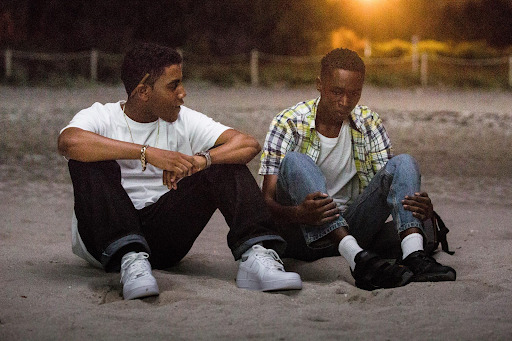
(Jenkins, Moonlight)
I think “queer cinema” is a visual style that is secretive, as in most of the films we watched for this blog. A secretive style can be dark or isolated. In Moonlight at 51m:20s-55m:50s when Chiron and Kevin are sitting on the beach in the moonlight is a safe place for them to be together. The darkness is the only time of day that Chiron can be himself. Oliver and Elio secretly persued their gay relationship in the secluded countryside of Italy in Call Me By Your Name. There are many examples throughout this film, but one is at 1h:45m:50s when Oliver and Elio go on a hike. Another way to show a “queer cinema” style in film is through the editing. Scenes can be cut in a way where only enough information is shown, giving it a secretive style. And by secretive, I’m referring to the hidden lifestyle like we see between Ennis and Jack as they go drive out to the mountains to hide their affair (1h:09m:30s). Their relationships are hidden because depending on each person’s race or living environment, it conflicts with what is considered ‘normal’.
As we saw in most of these films, race, gender, and sexual identities visually intersected. In Moonlight, we saw a young black boy struggling with his gay sexuality in a high crime neighboorhood in Miami. Then in Call Me By Your Name, we saw a young, wealthy white man exploring his gay sexuality in the natural countryside of Italy. These are completely opposite films in terms of race and status, but both protagonists are gay men who struggle with being open about their sexuality.
While films can educate or empower people, and even make us change our perceptions, films can’t change someone’s sexuality. That’s like saying a film showing heterosexual relationships can make a gay person straight. Cinematography doesn’t sway or change one’s sexuality. But the message of these films might empower someone struggling with their sexuality to no longer hide it. Just as films can change an anti-LGBTQ’s perception about LGBTQ. Boys Don’t Cry was based on a true story about Brandon Teena. When movies are based on someone’s life, they have more of an affect on the audience. I found an article about Brandon Teena’s court case and the end of the article summed up the message of the film. The writer of the article reached out to the Sheriff’s Office that investigated Brandon’s case to ask if they would be willing to attend a LGBT-sensitivity training program. The current Sheriff asked what was the definition of a transgender person. “I struggled to define it, but I basically came to the conclusion that a transgender person is whatever they say they are. It's a simple concept—honoring however people want to define themselves—but it requires a leap of imagination Lotter, Nissen and [ex-Sheriff] Laux couldn't make—and it would have made all the difference” (Fairyington, 2018).
Speaking about messages from films, I was disgusted by how mistreated and abused by society LGBTQ people were. I was hoping society changed a lot since the time of these films but that’s not the case. According to a 2020 FBI Hate Crimes Report, “Today’s report shows that hate crimes based on sexual orientation represent 16.7% of hate crimes, the third largest category after race and religion” (Ronan, 2020). There’s still a lot of ignorance about LGBTQ. Boys Don’t Cry is a great example of a film that opened my eyes to how life was for a transgender female back in the 1990s in a small town in Nebraska. The minute Brandon’s secret was out that he was really a female (1h:13m:07s-1:13m:55s), two men who didn’t agree with his sexuality came up with a plan to beat and rape Brandon, then eventually kill him. In Moonlight, Chiron got the crap beat out of him (1h:01m:05s-1h:02m:00s) simply because he was gay. Mysterious Skin showed the horrifying world of a young boy who was sexually abused by his baseball coach. I’m still not sure if Neil was gay or if he knew no other form of sexuality because of being sexually abused at such a young age. Brokeback Mountain showed how forbidden being gay was for two cowboys out in Wyoming. And Call Me By Your Name was the only film out of the five that didn’t result in violence once others found out that Elio and Oliver had a relationship. In fact after Oliver left and broke Elio’s heart, his father told him, “You’re too smart not to know how special what you two had was…just remember I’m here” (1h:57m:30s- 2h:12m:00s). Even though Elio’s family was open to their son’s gay relationship, it was forbidden in Oliver’s world.

(Magan, 2019)
These films showed me how difficult it was (and still is) for someone who is LGBTQ to live a life without fear. These films are educational and eye-opening. If that was each filmmaker’s goal, then they all succeeded with me. I just hope each film’s message has a bigger impact on people with no compassion for LGBTQ’s.
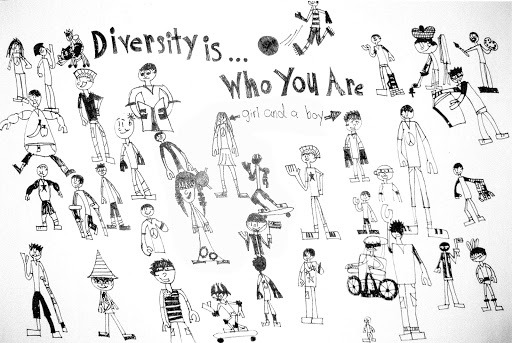
My entry for a 5th grade diversity art contest, 2013. I purposely sketched this in black & white as a symbolism of equality.
0 notes
Photo
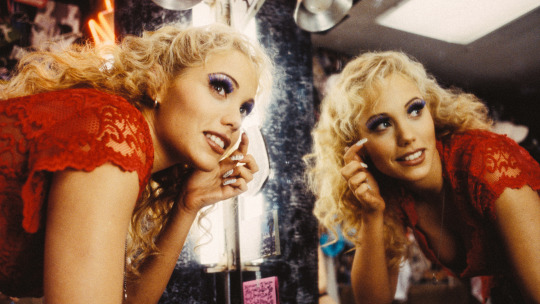
Pure Verhoeven.
Writer and director Jeffrey McHale talks to Dominic Corry about his new documentary You Don’t Nomi—an examination of the cult surrounding Paul Verhoeven’s 1995 “masterpiece of shit”, Showgirls—and recommends a few campy sequels to watch afterwards.
Few films have enjoyed as interesting a post-release existence as Paul Verhoeven’s 1995 film Showgirls. A classic “blank check” movie—that is, a film made with unnatural freedom thanks to a director’s prior success—Verhoeven and controversial screenwriter Joe Eszterhas attempted to build on the success of their 1992 smash Basic Instinct by upping the on-screen sauce in a riff on All About Eve, set in the “high-stakes” world of Las Vegas striptease.
Elizabeth Berkley, at the time still defined by her performance as the (mostly) virtuous Jessie in the Saturday-morning teen sitcom Saved By The Bell, led the film as Nomi Malone, a young woman who arrives in Vegas, gets work stripping in a low-rent club, then ascends to the sought-after position of lead showgirl in a big casino’s “classy” choreographed striptease show, replacing the previous star Cristal Conners (Gina Gershon).
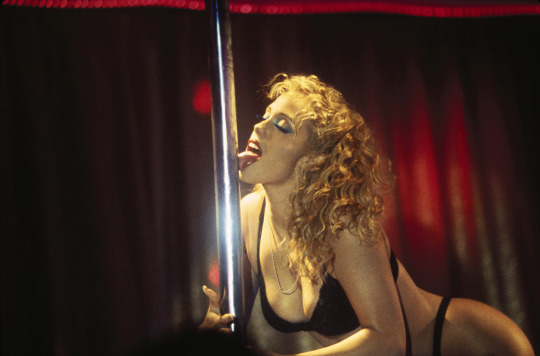
Proudly sporting the otherwise box-office-neutering NC17 rating, Showgirls was marketed as a serious adult drama about ambition and the price of success. It was not received as such, instead met with huge amounts of ridicule by audiences and critics alike. Pick a Letterboxd review at random, and you get, for example, “Beautiful direction, so if you put it on mute, it’d probably be great. But nearly every actor is sorely miscast and the script is the hottest garbage.”
Poor Berkley received a lot of the blame, and although she continued to work, the venomous (and often misogynistic) critiques hindered her career as a big-screen leading lady.
Then something funny happened—the film was re-evaluated as a camp classic, driven largely by the queer community, who embraced its over-the-top ridiculousness. The cult has grown considerably over the years, expanding into midnight screenings and even live stage adaptations. Subsequent DVD releases have leaned into the perception by offering commentary tracks that acknowledge the movie’s glorious failings.
Showgirls’ continued presence in the culture has even seen it experience something of an artistic redemption. Its perception is now well beyond that of being simply a camp classic that is so fun because it’s so bad—it’s a genuine cultural touchstone that tells us a lot about how audiences judge films featuring overt sexuality. Indeed, among the many ironies associated with the film is that it was partially designed to highlight American sexual hypocrisy, then failed spectacularly in a manner that effectively highlighted American sexual hypocrisy.
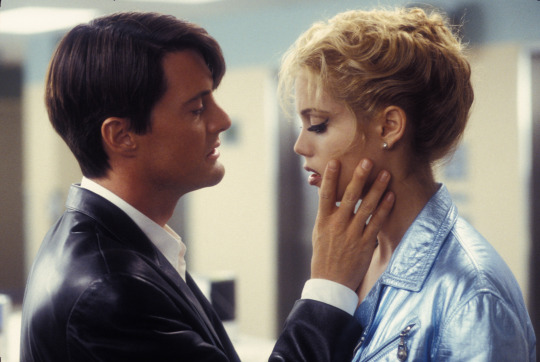
Kyle MacLachlan and Elizabeth Berkley in ‘Showgirls’.
A brief survey of Letterboxd reviews finds plenty of fans. In a half-star review alongside the exhortation to “please for the love of God watch Showgirls”, Letterboxd member Jesse writes: “There shouldn’t be any shame in liking something you know is bad, I don’t have to try and re-codify Showgirls as a secretly good classic just because of how amazing it is. It truly deserves its cult following.” Jesse makes particular mention of the infamous swimming pool sequence, a scene “so unsexy… that it achieves camp euphoria, a pure moment of enlightened cheese that needs to be seen to be believed”.
“‘So bad it’s good’ it may be for some but I happen to be among the camp that thinks Showgirls is genuine good: a misunderstood work brimming with brilliance,” writes Jaime Rebenal, while Matt Lynch argues that it’s often mistaken for “a satire of American greed and attendant dreams of stardom, when its true target is the apparatus that sells those dreams to an endlessly returning audience of narcissistic suckers.”
Or, as Joe puts it, “The Rosetta Stone for understanding this entire movie (if not life itself) is the shot of Elizabeth Berkley angrily slamming a ketchup bottle on the table and causing a bright red stream of ketchup to come flying out.”
Jeffrey McHale’s ridiculously entertaining new documentary You Don’t Nomi looks at the cult of Showgirls from a multitude of angles, including the evolving critical and cultural perception of the film, how Verhoeven’s characterization of his intentions have changed over the years, the significance of the film within the LGBTQIA+ community, and how Berkley eventually emerged from the whole affair as something of a hero.
McHale makes fantastic use of footage from Verhoeven’s killer filmography to emphasize his points, alongside interviews with a variety of cultural critics. He tells the story of April Kidwell, the writer, producer and star of I, Nomi, a one-woman musical comedy about the life of Nomi Malone before and after her adventures in Showgirls. Kidwell is a fascinating presence in the film, and not just because she also played Nomi in the stage show Showgirls: The Musical! and Berkley’s character in the Saved By The Bell-inspired Bayside: The Musical!.
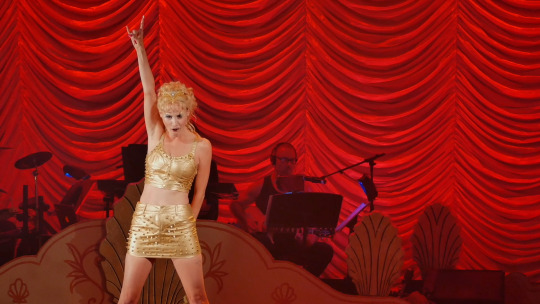
The twentieth-anniversary ‘Showgirls’ screening at Hollywood Forever Cemetery.
The documentary features illuminating footage from the twentieth-anniversary screening of Showgirls at the Hollywood Forever Cemetery in Los Angeles, an event that Berkley attended, where she received a rapturous response from the thousands of fans present.
McHale attended that screening, and told Letterboxd that that’s where his deeper interest in the film was properly sparked.
Jeffrey McHale: I had seen it already, ten years prior to that, but that was the first time I saw it with an audience. I think that was, officially, the largest screening of Showgirls that has happened. There were 4,000 people there. I’m not from LA, but I’ve lived in LA for the last eight years, and I’ve gone to a couple of those Hollywood Forever screenings and I don’t think anyone in our group anticipated Elizabeth Berkley showing up. It felt epic. It was a historic moment in the afterlife of Showgirls.
I didn’t walk away [from that screening] thinking ‘I should make a documentary’, but I was mostly interested in kind of finding out more. You’re always curious if you can figure anything out about the intentions or what the filmmakers had in mind, so that’s what inspired me to start consuming everything that had been written about Showgirls. I read the Adam Layman book, the book of poems, [lots of] articles, and I was just scouring the internet for reviews. And what I found was this wide range of really interesting opinions, theories and people’s relationships with the film. Everything was just so different. You set out looking for answers, and it’s not about getting the answer for it, it’s about this ever-evolving relationship that we have with this piece of art.
At what point did you come to realize the degree to which the queer community had embraced this film?
As a gay man myself, it feels like it’s part of the fabric of our culture, ’90s culture. The poet Jeffrey Conway, when I interviewed him, he said it perfectly: it’s just like in your DNA, you know? It appeals to the queer culture community, you cannot explain it but you’re just kind of drawn to it. I thought that was an interesting way of describing the experience of watching something like that.
This film appears to only be widening the cult of Showgirls.
It’s been a really fun project, and I’ve been blown away by the response it’s getting. I didn’t really know what the end result would be when I started. I knew that whatever you make, there will be a very vocal and excited and enthusiastic fan base. I’ve been very surprised by the broad appeal. These are people who have never seen Showgirls and are really drawn to it, and find the message and the story, the culture, and the way that we consume media, the way that we critically talk about things. It’s been a wild ride.
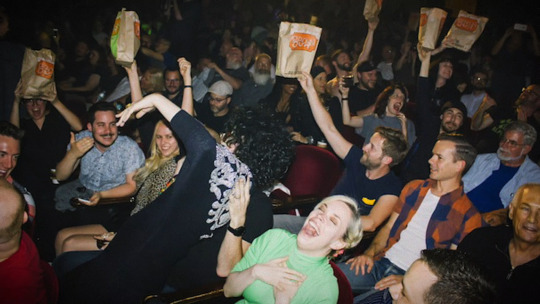
The twentieth-anniversary ‘Showgirls’ screening at Hollywood Forever Cemetery.
You point out the hypocrisy of how audiences are willing to see Verhoeven’s films as satirical when it comes to the violence (as with Robocop and Starship Troopers), but when it comes to the sex, the audience gets prudish.
Paul and Joe talked about that on a lot of their press junket interviews: America’s fine with the violence and the violence gets you rated PG13, but then you have something as human as sex, then that’s shunned and discouraged. It was interesting going back and just looking at the way in which Elizabeth was criticized. And the way that Paul was criticized. Just the way she was ripped apart for her physical features and all that, it was disgusting. I think we’ve evolved a little bit further in that sense. I don’t think that you’d see a Gene Siskel review, the way that he describes her face, those details, like comparing which one was hotter, it was like: this is what we’re reviewing? Actresses’ physical attributes? It was disgusting. I think we’ve gotten better in that sense.
How did you encounter April Kidwell? She brought a lot to the film.
She was one of the later additions to the project, after we’d started reaching out to people. I knew that she was in the musical. Then I found out that she had also done Saved By The Bell. It was really interesting that she played two Elizabeth Berkley characters, to get her opinion on it. From the very first phone call, she was just so open. I was blown away by her story and how vulnerable she was, just putting herself out there. She’s been very open about her experience and the way that it was therapeutic for her. She’s the heart and soul of Nomi. She’s somebody who went through something awful, disgusting, terrible, and now she’s found power and strength, within—specifically—the character. The act of performing Nomi on stage was therapeutic for her. It was an experience that no other person I spoke with had. She’s amazing.
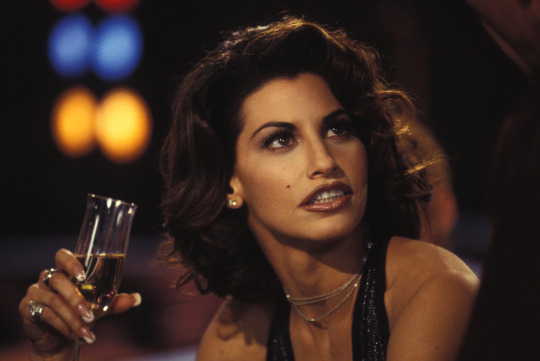
Gina Gershon in ’Showgirls’.
I loved how you used footage from the other Verhoeven films to provide additional commentary. How did you come to adopt that filmmaking strategy?
When I went in, I didn’t how much of that would play into the narrative. I wasn’t familiar with his earlier work. But when I started to go back and watched all of his Dutch films, I was surprised by how all the dots, everything just felt like it was connecting. All these motifs and scenes and shots. And how repetitively these things popped up. So I wanted a visual way, to kind of make it a subplot, where the characters were interacting with Showgirls, where their experience paralleled the contributors, so that was a way to visually tie it back to the argument that people like to think Showgirls sits by itself outside of all of Paul’s other films, like Starship Troopers, Robocop and Total Recall, but tying it into the argument that it’s Verhoeven at his purest, [which is what] I like to think of Showgirls as.
I’m a huge Verhoeven nut and I’d always been disturbed by the dog food subplot in Spetters [in which a takeout van sells croquettes made with jelly-meat], but I had never drawn the connection to Showgirls [in which Cristal and Nomi bond over both having once been so poor that they had to survive on dog food]. I’d also never noticed how much vomiting is a recurring motif for him.
Yeah! Women vomiting! It was always women that were throwing up, which is just bizarre. The doggy chow thing I thought was interesting because [initially] I felt like ‘oh this is a Joe Eszterhas bit’, something from his script that’s just bizarre and weird, but then when I saw that thread from Spetters, it was just like ‘oh my god, you’ve done the whole eating doggy chow thing before’.
I’ve always been interested in Verhoeven’s evolving description of the film himself; how he has recast history a bit to say he was in on the joke, but the funniest thing I thought he ever said about it was that he regretted not putting a serial killer plot in Showgirls, because that would’ve distracted the Americans. Had you heard that?
I have yes. I think Adam Layman mentioned that. [Verhoeven]’s like: “Basic Instinct was enough of a thriller that people could watch it.” That was something I’d heard a couple of times before. I think he’d actually been considering it, like a death or a murder or something.
Thanks for making your list of Campy Sequels To Watch After Showgirls. Talk us through them. What did you make of Showgirls 2: Penny’s From Heaven? I’ve only seen clips.
It’s a film that might be better in small doses, not one whole thing, because I think it’s, like, two and half hours long. I think it took me a couple of viewings to get through the whole thing. But it’s interesting because [filmmaker] Rena Riffel plays Penny/Hope in Showgirls. She wrote it, directed it and starred in it, and it follows her character playing off Nomi’s leaving Vegas to go to Hollywood. [Riffel] was in Mulholland Drive, so part of me thinks she was trying to do a David Lynch thing. Or a John Waters thing. She’s definitely very aware of the afterlife and the over-the-top campiness of it. So there’s all these little Easter eggs where she’s drawing comparisons to Showgirls. But it’s super low budget, and she kind of embraces that. I would recommend it to hard core fans of Showgirls; it’s definitely not a movie for everybody.
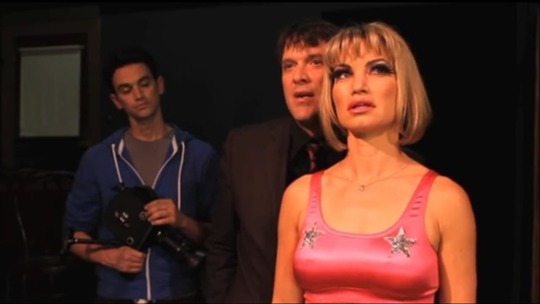
‘Showgirls 2: Penny’s From Heaven’, featuring writer-director Rena Riffel (right) as Penny.
Grease 2
‘Cool Rider’—amazing. Christmas-tree dress. I like that the gender roles were flipped. And it’s a fun movie. It’s a fun movie that I always enjoyed as kid.
Gremlins 2: The New Batch
That was another one that I saw late. And I mean, the musical number, Hulk Hogan, just knowing that the director went all out and didn’t hold anything back. I mean—Vegetable Gremlin? There are just so many things it in that are bizarre, and it didn’t follow the traditional 80s/90s sequel formula.
Beyond The Valley of the Dolls
Yeah. You know that Roger Ebert wrote that, right? That’s another one that’s probably closer to Showgirls 2 in the Russ Meyer aesthetic of it. But these are all films that had similar [critical trajectories]—it was panned when it came out but got [a] second life. I mean not to the scale that Showgirls has, but I think people revisit it and embrace it for what it
Magic Mike XXL
It feels like they’re more in on the joke, and I kind of found it more enjoyable than the first one, just because it didn’t seem like it was taking itself so seriously. And Jada Pinkett Smith is kind of playing the Matthew McConaughey role. It’s The Big Chill meets Chippendales. And as far as the dance numbers go, it feels a lot campier and they’re a little bit more aware of what’s happening. Not as much as like a failed-seriousness kind of camp, but there’s something going on there.
Final question. Showgirls: good or bad?
I call it a masterpiece of shit.
‘You Don’t Nomi’ is available to stream or rent on digital and VOD services.
#showgirls#showgirls 2 penny's from heaven#paul verhoeven#joe ezsterhas#camp classics#lgbtqia#queer cinema#elizabeth berkley#jeffrey mchale#letterboxd
9 notes
·
View notes
Text
reflections in wisps
Length - 2457 words
Characters - Seokjin x Jaehwan, BTS Ensemble
Rating - Teen and Up
Summary - Seokjin knows he won’t have Jaehwan for long. The illusion of their love is a false reflection in the fading wisps of feelings they once harboured for each other.
Series
Tag List - @tomatoholmes @merlionmen @seraphistols @k-craze-97 @blossomtearsleo
-
“You’re smoking again”
“I was wondering when you would notice it and ask me to stop”
“I don’t think asking would have actually made you stop.”
“I guess not”
-
When Jaehwan returns, he apologises to Seokjin.
Jaehwan apologises but makes no excuses. It’s part of what Seokjin likes about Jaehwan. He has no lies or cover ups or excuses. He comes down to the fancy apartment they share in the ‘right side’ of town after disappearing for days and tells him he is sorry.
He doesn’t tell Seokjin what he is sorry for and Seokjin doesn’t ask because there are things he should be sorry for and he doesn’t tell Jaehwan about them either.
Instead they kiss. It’s easier to be lost in the way Jaehwan’s lips on his skin give him goosebumps and how the warmth of someone else feels just right when he has been deprived for so long. Sex doesn’t require thinking. Sex doesn’t even require feelings if you are doing it right.
And so he kisses Jaehwan back and let’s the thoughts in his head be drowned out behind white noise.
-
Seokjin grows up in a house in the posh suburbs to the east of the city. He grows up in a small two storeyed house with a flower bed in the front yard and a white picket fence all around. He even had a sugar glider briefly but he forgets the name.
His life changes drastically when his father decides to run for the local government body. Suddenly his family is thrust into the limelight and his father’s PR team decides to use the opportunity to broadcast how virtuous and well behaved they are.
His mother and brother fare better under the scrutiny. His mother is traditional and believes in supporting her husband and hence has no problem playing the part of the loving partner. His brother is ambitious. He studies business in a prestigious business school and starts his own business, riding on his father’s fame. He humbly attributes his success to the values his parents instilled in him at any public event and even marries the daughter of their father’s biggest sponsor for campaigns.
Seokjin does what any sensible young adult would when faced with life changing events out of their control.
Seokjin rebels.
He goes to the local art college to study filmmaking. Despite his gorgeous face, he becomes an assistant director with a non-profit organization that works to raise awareness about issues plaguing modern society through films. And as the last nail in the proverbial coffin of his good boy image, he starts to date Lee Jaehwan. A good for nothing who brings no addition to their family’s social status, his grandmother announces over a family dinner and Seokjin kisses Jaehwan in front of everyone to “console him”.
-
“Try not to give someone an aneurysm” Hoseok pleads, adjusting Seokjin’s wonky bow tie.
“I make no promises,” Seokjin says with a devilish smile.
“Okay. I’ll treat you to coffee for a month if you can wait till after the auction has concluded before offending someone with a witty remark” Hoseok says.
“Of course I am not gay, I am merely waiting for the right girl to make an honest man out of me. Of course my parents are doing well, I called them just the other day. Yes my brother’s business is doing great, I am very proud. If only I was more like him” Seokjin says in a shrill voice and Hoseok gives up on any hopes he has.
Seokjin follows his friend who navigates through the crowd and talks to the crowd attending the art exhibition he has curated. It has the most ostentatious, the creme de la creme of society in attendance and Hoseok has high hopes to earn the profits he needs to keep the museum running tonight. And Seokjin is many things but not a bad friend so he sticks to the flutes of champagne supplied helpfully by the servers and makes a polite comment here and there but says nothing more.
“Isn’t she a beauty?” Hoseok asks, when he finds Seokjin looking at one of the modern art pieces on display. It’s a realist painting of a diner in a small town. The diner has large glass panels that lets the onlooker see inside and note the people sitting down by it and a waiter serving them from behind the counter.
“What’s the story behind this?” Seokjin asks. The diner is dreary to look at and inspires no strong emotions but that is how real life is. Nothing interesting ever happens and Seokjin can hardly blame the artist for depicting the truth of the world. It’s also surprisingly devoid of people and meaningful interaction, like it is an image of a lonely time, sliced out of the flow of time and captured on canvas. It’s how most of his nights look now but Seokjin quickly squashes the depressing reminder.
“Nighthawks by Edward Hopper. A classic modern art piece” Hoseok tells him. “It’s supposed to be a comment about loneliness in the urban lifestyle of the 1940s America.”
“Still holds,” Seokjin says, taking a sip of his champagne. His cheeks burn with warmth but he ignores it.
“Is it already bid for?”
“Not very high if you’re thinking about buying it. Everyone is going for the more well known modern art pieces or the fancier classics” Hoseok says. Seokjin takes a cheque book out of his jacket. He didn’t intend on using it tonight but life has never gone the way he intended it at any time.
-
“What do you think?” Seokjin asks once the crew from the museum installs the painting in the living room and leaves.
Jaehwan looks at the painting and says nothing. Seokjin knows he hates it. But it is magnanimous of him not to voice it immediately. The painting has grown on Seokjin and he can’t bring himself to regret the small fortune he has spent on it.
“I like it” Seokjin responds when Jaehwan doesn’t. He reaches out and adjusts the painting so that it is perfectly parallel to the edges of the wall.
“Why this specific painting?” Jaehwan asks.
“I liked the irony of a social place being used to depict loneliness. It spoke to me spiritually” Seokjin says. He goes on to add the analysis of the painting that Hoseok gave him about loneliness and despair and how the want of company and comfort is a thing that hasn't changed over decades and continents.
"You could add a funky neon sign with a few letters blinking or not lit up and it would be any themed diner here in South Korea" Seokjin jokes before admiring the way the painting looks on the light cream coloured walls of the apartment.
Jaehwan stares at the painting and never looks at it again for the remainder of the night.
-
Things almost go back to normal but they really don’t.
Jaehwan takes Seokjin on pretty dates to pretty places during the day and whispers dirty things into his ear as he kisses him at night. It’s almost like the days he disappeared and the fights they had didn’t exist.
But he also dazes out in the middle and never really pays attention to whatever Seokjin is talking about. He hums and responds at all the right places in a conversation but never really means any of it. Jaehwan also takes to his old habit of smoking in the balcony after every night they spend together. It’s like whatever happened in those days has changed everything between them.
Seokjin knows that the ground beneath his feet has shifted. He’s no stranger to that feeling of the world changing overnight. Only this time, it happens so quietly that Seokjin really doesn’t know how to deal with it.
How do you hold onto smoke that lies within your reach but cannot be held? It only shifts out of his grasp, just far enough to never truly be held and just near enough to suffocate him slowly.
-
“I have news for you” Jaehwan says, looking at Seokjin. “Taehyung liked the manuscript I sent in. He’s suggested minor changes and decided to forward it to Namjoon. If Namjoon likes it, I will get a publishing deal.”
“That’s amazing,” Seokjin says and finds that he really means it. “I didn’t even know you were planning on sending it in.”
Jaehwan and Taehyung have an awkward history. Taehyung is a book critic and editor for Namjoon’s publishing house and someone very familiar with Jaehwan’s writing from his newspaper columnist days. Taehyung always claims to have fallen in love with Jaehwan’s writing way back then. But Seokjin knows that Jaehwan wants nothing to do with his old life and so he usually diverts Taehyung's attention away from it.
“It’s nerve wrecking as fuck. I hope this becomes popular as hell so I never have to write ever again” Jaehwan swears. Seokjin laughs.
“Let’s open up a new wine bottle. Yoongi recommended this new brand of red wine that I got a bottle of and you can tell me what your new book is about” Seokjin says. It’s a little too early to celebrate anything but a little cheer will be good for them.
“It’s just a story about… people. Places and things. Nothing and everything” Jaehwan says vaguely as he gestures to the air around him.
“What a thrilling description. I’ll ask Namjoon to put it on the book cover” Seokjin says wryly. For the first time in a very long time, Jaehwan laughs and Seokjin laughs with him.
-
What Seokjin does ask of Namjoon is a copy of the finalized manuscript that is approved for printing.
Namjoon loves the book and gives it a raving review. The publishing deal is finalized quickly because Taehyung does not want to give Jaehwan the chance to change his mind. Before Seokjin knows it, a thick bundle of papers tied together with a large gaudy paper clip and sealed in tacky brown packaging arrives at his doorstep.
Seokjin keeps the manuscript a secret. He wants to let Jaehwan offer a signed personal copy for keepsake. But he is also a curious soul and this trait always gets the best of him.
Jaehwan is out for the night. (He is always out for some reason or the other.) So Seokjin pours himself a glass of cheap store bought red wine and puts the manuscript on his lap and begins to read.
It's a story of a lost man. A man who feels lost even though he is loved by all and a man who doesn't know himself though everyone around him is quick to label their relationship with him and by extension to label him. The protagonist spends half the novel wandering and pitying himself till he meets someone and falls in love. It's a forbidden sort of love and sucks both men in till their feelings overwhelm them. The protagonist leaves by the end because the protagonist always does but he leaves his heart in the tiny dingy motel they met in and even that admission is a guilty confession to the wide vacuum of an uncaring world and not to the object of his affection.
Seokjin reads through the manuscript in one setting. Jaehwan is just that good with his words and Seokjin knows this is a rare glimpse into his mind that no one else is afforded just yet. Jaehwan will make it big. No wonder Taehyung is anxious to have the deal under his publishing house. Jaehwan writes about true love and heartbreak in a magnificent way that anyone can understand but can only hope to experience in their lifetime. At once the grandeur of heartbreak is within your grasp and just out of your reach.
When he finishes the manuscript, he looks at the painting hanging in the gallery and understands Jaehwan's surprise. He rereads the last confession and understands Jaehwan's disdain too.
-
"I don't have excuses" Jaehwan says, when Seokjin finds him smoking on their bedroom's balcony.
"You never do" Seokjin says, sitting down next to him.
"I'm a shit liar for a writer" Jaehwan admits. Seokjin scoffs and rubs his nose. He is resigned to the situation but he doesn't find the smell pleasant. Nothing will endear him to smoking, he thinks. Not even the oncoming heartbreak.
"You're much better than you think you are" Seokjin says. Jaehwan gives him a searching look. How much does Seokjin already know, Jaehwan wonders. The painting from the living room is gone and Jaehwan has seen the copy of his book on Seokjin's nightstand.
"How much did you read?" he ventures to ask. Some band-aids are better ripped off as soon as the wound stops bleeding.
"All of it" Seokjin replies honestly.
"I didn't mean to break your heart" Jaehwan tells him.
"You don't get to decide what hurts me and what doesn't" Seokjin says sharply. He doesn't like the way Jaehwan genuinely sounds apologetic and guilty. He hates how it isn't motivated by love and merely by concern over a relationship that should have died much earlier.
"Why did you come back if you thought you really loved the one you left behind?" Seokjin asks.
"Because that ending is… a white lie. A romantic ending to make the book sellable. I didn't fall in love when I was at the motel. I didn't fall in love with someone else" Jaehwan explains.
"You only fell out of love with me" Seokjin summarizes breezily. Jaehwan draws a deep breath of his cigarette and turns away to let the smoke out. This hurts more than Seokjin thought it would.
The two men sit in the balcony and avoid looking at each other. The air between them is thick with tension, stuffy from the remains of what once was and will never be again.
Seokjin watches the tendrils of smoke rise from the last of Jaehwan's cigarette through its reflection in the window glass. The ember glows till it dims and fades out, leaving only smoke in its wake.
He wonders if the disappearance of the carbon means he can pretend that the smoke never existed once sufficient time has passed. Or if the smell will taint his memories forever like heartbreak threatens to taint the rose hued past blue. He wonders if he can lean forward and catch the smoke as it twists in and out of the air current to rise up and disappear into nothingness. He wonders if the smoke was always meant to escape and if the paper was always meant to burn to give it the freedom it so runs after.
In the end, all the smoke does is suffocate him and make his eyes water.
-
1 note
·
View note
Photo
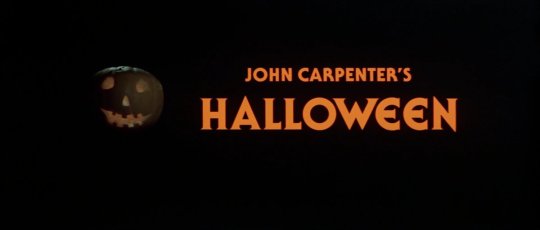
you heard it right folks, for the second year in a row i watched
Every Halloween Film
it took around 18 hours. there are eleven movies now after all. next year there will be twelve, and next year i will throw myself into the river thames if i make myself watch Rob Zombie’s Halloween II again.
this time i wrote it out as a journal. it is a mess. i will not edit it. if you read the entire thing you dont get a prize. im very, very tired. i watched eleven movies today. i like five of them.
9:27- I boot up Halloween (1978). I don’t know if this is the movie I’ve seen the most in my life, but I’ve certainly seen it dozens of times, and it never loses its impact. I’ve gotten to the point where I’m reading into micro-expressions on actors’ faces and I don’t know how much any of this was ever intended, but it certainly enhances my own reading of the film. I catch the expression of slight annoyance on Judith’s face when Michael walks into her room; it’s clear she had just no idea this was coming.
9:37- The staging of the opening of Halloween is so like a nightmare, a comparison I keep using this year for the movies I watch, but there’s a sense of being placed in the immediacy of what’s happening with no context and a burden of responsibility that only exists in dreams in the first few opening scenes. You don’t know where you are or what you’re supposed to be doing, but something huge and terrible is happening and the thick, dark shadows combined with the pale white-blue light the film uses makes everything emerge out of the black but never truly divorce itself from the darkness.
The way Loomis talks about Michael like some kind of animal is such a point of fixation for me. He calls Michael ‘it’ and wants ‘it’ to be locked up for life. Maybe it’s just being of a crazy persuasion myself but being the responsibility of a doctor who despises you and refers to you as an untreatable evil doesn’t feel like it would be much help to me. I just don’t think Loomis is a great doctor, is my point.
Laurie’s introduction is such a surge of light in a film that has up until now been shot almost exclusively in darkness. We are shown someone good, normal, happy, but the long, distant shots mean we are not accompanying her on this journey from her perspective; we are following her. Halloween legend suggests Michael doesn’t start stalking Laurie until she approaches the Myers’ house, but it feels like his eyes are lingering on her long before she does that. He casts a long shadow over her life before she even knows he exists.
9:42- The fact the film approaches the idea that it doesn’t make sense Michael would know how to drive a car but doesn’t explain it at all is weirdly funny. Just fuck it man, he can drive.
9:45: I really love the focus on Michael as a physical being. The fact we see him touch someone with his hands, open a car, steer while driving, run his hand over a fence… All of this adds a sense of Michael being tangible that I think is so vital. Michael Myers is a human being, not a demon, and that’s precisely why he is scary. Halloween as always meant to be a movie about the person next door; the fear comes from the fact that something inside your apparently nice, normal neighbourhood is rotten to the core. Laurie herself is incredibly on edge almost from the start; she knows something is wrong. She just hasn’t figured out what yet.
9:57- The gravekeeper’s insistence that something like this happens in every town is probably right on the money. It’s definitely what the film wants you to understand. The apparent nicety of your hometown doesn’t mean it’s free of violence, only that you’re trained not to notice it.
10:01- at exactly 0:33:16 Michael drives by in the background right behind Loomis without Loomis noticing, which is hysterically funny to me. I imagine Michael finds this incredibly funny too.
10:02- Laurie saying she’d “rather go to the dance with Ben Traimor” smacks of being a teenager and gay and saying the name of the first kid you know who’s nice to you because you guess that’s what having a crush is?
10:05- Loomis’ insistence at 0:37:12 that Michael killed and ate a dog raw is incredible to me. Also, I can’t say “Michael raw dog” to my friends without them screaming hysterically at me. They’re fuckers, and I hate them
10:07- From Loomis’ description, he met Michael when Michael was six, already condemned by the doctors as an incurable patient, and stopped treating Michael and turned to insisting he be locked up by the time Michael was fourteen. I think about this a lot.
10:13- “I’m not about to let anything happen to you.” I’m always very touched by Laurie’s immediate assertion of her position as a protector of children.
10:19- Lindsay caring literally only about watching horror movies is incredibly relatable. Truly a hero I can finally understand.
10:28- The house across the street, Lindsay’s house, is almost as haunting as the Myers house itself. It’s certainly a beautiful spectacle, the huge white building with its pillars and vast, blank windows, looming out of the darkness like a moon-lit tombstone. Laurie always seems so lonely when she watches it from the outside.
10:33- The head tilt after Michael pins Bob to the wall is so fucking iconic. It’s the first time it was done, I believe, and while it’s a cliché now it’s still chilling. The way Michael just studies Bob’s corpse, thoughts completely unable to be interpreted. The fact he turfs up in a ghost costume wearing Bob’s glasses moments later is so strange; there’s really no reason he would do that at all, other than the idea he finds it funny. There’s more showmanship to what Michael does than people recognise a lot of the time, I think. It’s like he really wants his work to be seen.
10:43- The shot of Annie on the bed under Judith’s tombstone has to be one of the most beautiful shots in the franchise. The perfect arrangement made just for Laurie to walk in on and experience in one precise way is so meticulous. Michael’s obsessiveness nature manifest in so many ways. The final showdown between Michael and Laurie is only around ten minutes long but it’s an incredible endurance test of a scene; the way Michael grows out of the shadows like he’s being formed within them is still beautiful and terrifying.
I think a really underrated part of this sequence that makes it so frightening is how Laurie is pointedly not alone; the neighbourhood she’s in is populated, and there are people around her. But when she runs to the neighbours for help, screaming and banging on the doors, they choose to ignore her. Seeing something they don’t like in their neighbourhood, they shut it out.
10:50- the closet scene is an incredible piece of filmmaking. There’s really never been anything before or since. I love art with a lot of lines and shadows and seeing the shadow of Michael moments before he breaks through the door is so haunting.
10:52- Laurie desperate and holding the knife in her hands is stunning. I love her.
10:54- I love the brief glimpse of seeing Michael’s face and how it stops him dead in his tracks. The fact he looks so painfully normal is so important too.
10:55- There’s a lot to be said about Loomis confirming Michael is ‘the Boogeyman’. I think Michael’s definite physical humanity in this movie is so important because it contrasts so strongly against the dehumanisation of him by the characters around him. We can only accept there’s a nightmare inside our neighbourhoods if we choose to believe it isn’t natural to it; that someone like that could not form there, but must have been artificially summoned, like a demon. Later movies and the remakes run with this idea; that Michael is somehow an outsider, but I think that defeats the entire point. Michael is part of this world just as much as Laurie is, whether we want to believe it or not.
10:57- I should be starting Halloween II but unfortunately, I have to go to the pharmacy. It might be Halloween, but prescription medications wait for no slasher villain.
11:13- I start watching Halloween II (1981). I like that this movie starts off with Mr Sandman. Horror movies having nursery rhymes in them now is another cliché, but this is such an interesting pick for Michael. I suppose it fits with him being the Boogeyman; he’s a creature of nightmares that slinks into our homes only through dreams. Allegedly.
I like the decision to pick this movie up right after the last one stopped, something that it looks like 2020’s Halloween Kills will be duplicating. It just makes a straightforward kind of sense.
11:21- The hysteria of Loomis screaming “I shot him six times!” over and over is sort of funny and sort of sick. There’s a slight traumatised, obsessive lunacy in Loomis the same as there is in Michael. I like the parallels between them. Loomis raised Michael more than Michael’s own parents did; it makes sense he’d have a lingering affect.
11:23- The shots from Michael’s perspective both in the first movie and this one are great. I love that we’re challenged to be inside his mind. We follow Michael a lot in this early opening. There’s an obvious strategy to his actions in this film, but the randomness of his kills are new. In the first movie, all the kills either get him something or revolve around Laurie. In this one, he kind of just does whatever, a theme that carries on for the rest of the movie.
11:24- A difference I don’t like so much in this movie is that the neighbours are so much more keyed into each other; they pay attention to the screaming and the strange noises, watch out for things that look out of place. I feel like it clashes with the first movie’s themes of isolation simply through your neighbours not caring what happens to you.
11:32- Ben Traimor getting hit by a cop car which crashes into a van and then explodes is one of the funniest fucking things that’s ever happened in this franchise. It is so completely fucking inexplicable and suddenly violent and pointless that it becomes hysterical, which is unfortunate given it’s meant to be a serious scene.
The breakdown scene that follows, where the Sheriff Brackett finds his daughter Annie is dead however is excellent. Charles Cyphers manages to carry the weight of the tragedy pretty effectively for a film that can veer into the goofy too easily, and Dr Loomis’ more measured delivery on his beliefs about Myers is Donald Pleasance at his best.
Halloween II isn’t any longer than Halloween, but the pacing is worse. It lets go of the original’s constant, haunting tension and delivers a sloppier movie as a result, too padded with side characters and people passing through the world with no consequence. The character of Brett is probably one of the most obnoxious characters in the franchise, which is saying a lot.
11:46- Laurie literally not knowing it was Michael Myers who was after her until she’s told is weirdly sad. Like of course she didn’t know, but it’s still sad. She feels very small and vulnerable in this movie, very lost in the big, empty hospital. The fact her parents are inexplicably missing and never shows up makes me crazy. I always wonder if there was a dropped plot thread where Michael was meant to have killed them, or something, because there’s really no explanation.
11:53- The musical stings in this movie are so odd. They’re too bleepy. Don’t know what the hell happened.
11:55- I take the laptop into the kitchen to make a sandwich while I watch the movie. It’s early for lunch but I don’t eat breakfast and I can actively feel my braincells hurting me.
12:01- I’m fascinated by the shots in this of the faint dream Laurie has of seeing a boy in the hospital when she was a child. I can never decide if these are real or not; if she’s unlocking some strange, contextless memory from childhood or just imagining it, instinctively feeling the connection between her and Michael without knowing the truth.
12:04- Bud’s off-screen death is so unsatisfying. Also, so continues the trend of Michael being mistaken for people’s boyfriends. Guess he’s just boyfriend material. Seems unbelievable to me she wouldn’t notice how dirty his hands are, though. And Jesus, the boiling her to death kill is really pretty brutal and graphic, after kills in the first few movies are so relatively restrained.
12:07- Michael writing SAMHAIN on the wall is so over the top. Yeah, I can believe he’s fucking 21 years old. Michael is a performance art student.
12:09- Laurie having Michael’s ability to go deadly still and silent is neat. I like them having links. They’re siblings after all. Runs in Myers family.
12:11- The needle into the side of the head kill is bizarre. Also, the head-tilt here feels cheap. I have already started stealing candy from the bowl intended for trick-or-treaters. In my defence, I could, and I wanted it.
12:20- I like that Laurie has an instinct to run, hide and defend herself. I don’t know if it’s the trauma of surviving or a prenatural sense that Michael is coming for her, but I like it. I don’t like that this entire movie is like twenty minutes longer than it needs to be, or how little Laurie is actually in it.
12:28- The reveal that Laurie is Michael’s sister is so great. It fits so well. I say bullshit to anyone who doesn’t like it. The repetition and obsessiveness of Michael’s behaviour, the strange links and parallels between Laurie and Michael. The fact that the two of them are just as much parts of Haddonfield as each other. It just feels right for them to be related. They are related.
12:31- Laurie crawling on the street begging for help as Loomis ignores her again – this man is truly useless.
12:33- Michael walking directly through a glass door is hysterical.
12:38- Laurie calling Michael’s name, stopping him for a second, blinding him with a shot… This last sequence is fantastic. There’s an enormous amount of pity in seeing Michael blindly stumbling around, swinging his knife, unable to see but still so desperate to kill. The fact she stops him by calling his name is great. The way it almost, for a second, perks some recognition inside him. I think a lot about Michael’s sense of identity. Who does he think he is? I guess we’re never going to find out.
12:43- Halloween III: Season of the Witch time. There’s a trend now of saying this is really the best Halloween movie. I can’t really argue with people’s personal takes, but there’s always a sense to that to me of denying the classic to favour the underdog. People love an underdog. But Halloween III definitely does kind of rule. As much conspiracy thriller as it is horror movie, Halloween III is deeply weird and creative, but packed with great performances and truly memorable special effects, with a killer soundtrack to boot.
1:11- Halloween III is so distinct feeling; it almost feels like a John Carpenter movie, but more like The Thing than Halloween. The film is less aesthetically distinct than Halloween; it takes place over days, in many locations, following the characters as they dig into the conspiracy behind the menacing Silver Shamrock company. It’s well-written and often pretty witty and builds an incredible sense of menace and strangeness. The little company town surrounding the Silver Shamrock factory is bizarre and frightening and although the film can be a little heavy-handed in its depiction of a surveillance state, it certainly builds up atmosphere.
1:20- The scene of the old drunk being taken out by the corporate men in black rules in how suddenly violent and horrible it is. We love a horror movie.
1:26- Some of the digital effects leave a little to be desired but god the practical effects are fucking incredible, and so goddamn memorable and horrible.
1:33- The over-the-top niceness of the Silver Shamrock owner is so pitch-perfect. He’s so nice that it’s obviously, blatantly menacing. What owner of a big corporation like this just gives shit away for free? I mean, come on. I really love the apparent legends that surround him, though, the reputation of being a genius and a great man.
1:48- The complete calmness with which the whole plan gets revealed is so good because you really sense how fucking little threat our heroes pose; no one here thinks they have a chance in hell of stopping Silver Shamrock. The plan in itself is absurd, but like, who cares. It’s fun. The fact Cochran is like, delighted to show off his big ideas because he’s so confident nothing will stop them. And in a way he’s right; at least partially, the heroes do ultimately fail.
2:00- the speech Cochran delivers about the power of Samhain rules. It’s so intense and menacing. Fucking great performance here.
2:07- As much as I like the ending, I think how much it drags on kind of kills some of the tension. Feels like it could have been cut back. The imagery at the very end is fantastic though; it’s so weird. The way this movie embraces strangeness is great; I’ll always take a film that tries to be something different and weird over anything that plays it safe.
2:20- Halloween 4: The Return of Michael Myers. Jesus we’re starting down a dark path now. Halloween 4 is pretty thoroughly ‘ok’ and even has a couple of good moments but God. The decision to return to just being about Michael Myers after risking and flopping with an anthology movie is fine by me, but Halloween 4 plays it as safe as possible and lacks any of the flair or charm of the original. It just doesn’t have any style, and the forced drama falls short. Jamie Lee Curtis’ absence also feels like a sucking void in the film; it’s too painfully obvious that she was meant to be in this movie, and the fact she isn’t, the fact she died off-screen in some completely nondescript way is so depressing. The filmmakers assumed no one watching gave a shit about Laurie, and that’s so wrong and so disheartening.
2:25- the other doctors hating Loomis really adds to my reading of him as a man on the brink. He must be insufferable to know.
2:30- It really feels so painfully fucking unfair that Laurie would go through so much to just die in a random car accident. Or maybe there’s a kind of poetry in her dying without Michael’s involvement; just part of her own life.
2:36- Donald Pleasance is such a mensch. As stupid as these movies get, he never stopped bringing his fucking A-game and giving them as much respect and gravitas as he could. What a fucking legend.
2:41- Loomis seeing Michael in the diner is so fucking good. Loomis’ quiet pleading, asking Michael not to go back to Haddonfield but just take him instead, the quiet God damn you. Such a great moment. Would be better if Michael didn’t just suddenly teleport out of the room with no explanation, but you can’t have it all.
2:42- Why are later Halloween movies so fond of explosions.
2:43- The kids literally chanting ‘Jamie’s an orphan’ at her is incredible. Not in a good way.
2:50- I fetch the kitten to keep him on my lap because my house is colder than Michael Myers’ black heart.
2:55- Michael looking at Laurie’s photos… Ugh.
2:56- Why do people not just believe Loomis when he says Michael is back. We have this thread every week, comrade.
3:06- Michael just kinda standing around in the background doesn’t really do much in terms of fear. It’s just silly. And his mask looks ridiculous.
3:12- This film is a masterclass in failing to raise tension.
3:23- There’s an attempt to manufacture conflict by having the police clash with a group baying for mob justice, but it all feels completely inert. Nothing in the film carries any weight or drama, and the tension is all derived from using familiar music stings to try and kick your brain into recognising it’s an appropriate place to feel something.
3:25- The kitten bites me, drinks my water, and goes to sit in a box instead. I hate him. The kill where Michael stabs someone through the gut with a shotgun and pins them to the wall is the most flagrantly absurd thing I’ve ever seen. The fact she’s immediately found also really kills the tension. Also why is Michael so fucking strong. He’s so strong.
3:31- I can see the intention with the roof scene, but there’s too much unintentional comedy and Michael is so unthreatening that it doesn’t hold together at all. I especially hate how Michael will just suddenly appear out of nowhere; the first movie utilises his forming out of the shadows so well, but it doesn’t fucking work the same if he’s just there, in a formerly empty and well-lit corridor. He’s not being beamed in by a spaceship.
3:39- God this film is slow. Michael’s hands look absolutely terrifically fucked up. I wish Laurie was here.
3:41- It is insufferable how this film has like ten climaxes. Jamie running to inspect Michael really just doesn’t make any sense. I understand why the filmmakers did it, but it doesn’t make sense. They allude to some connection between the two, but it’s really underplayed and doesn’t pay out well when so much of the movie is her being flatly scared of him. They could have – and should have – acted more on the idea of her finding some sort of familiar connection between them. Famously, the movie ends with the idea Jamie might have somehow inherited Michael’s drive to murder, but the plot thread disappointingly gets dropped after this movie.
3:47- It’s time for Halloween 5: The Revenge of Michael Myers. God, this movie is such a non-entity in the franchise. It doesn’t have 6’s turbulent history or 4’s dramatic ending. It just like, occurs. It occupies space and time. It tries to further the connection between Jamie and Michael, turning it into something psychic and supernatural, and begins to introduce elements of the Cult of Thorne before that takes over as the plot of 6, but none of it is interesting and I also hate the attempt to make Halloween a supernatural franchise.
4:04- The totally legal for sure stream I’m using starts fucking up so everything takes a break while I find somewhere else to watch it.
4:05- Contemplate if life is worth it.
4:06- Film returns. It’s not worth it.
4:27- If screaming at kids was always Dr Loomis’ brand of psychiatry no wonder he couldn’t help Michael.
4:30- You really need to put in more effort than this if you want to make someone being murdered in broad daylight scary. If you’re not putting in the kind of effort Midsommar does to sell the death, you aren’t gonna get there. Halloween as a franchise seems obnoxiously dedicated to doing shit in the middle of the fucking day, for something who built the power of the original scares so much off of the quiet and darkness of the shadows.
4:39- Imagine leaving a traumatised child alone because you want to get laid. Tina’s character is fucking absurd. There are far too much entirely interchangeable faces in this movie screaming incoherently.
4:57- The scene of Michael desperately trying to run Jamie over with a car while the camera swings around hysterically and then the car inexplicably exploding is like peak mid-sequel Halloween. It really exemplifies how much the franchise started relying on noise and flash instead of like, being scary.
5:02- Loomis begging Michael to ‘fight the rage that drives you’ and saying that killing will never drive the anger out is too little too late, ain’t it. I like the idea of an appeal to his emotions but there’s so little emotional weight to the rest of the movie that it fails to maintain a meaningful tone. All the moments where Jamie is communing with Michael are supposed to drive tension I guess, but it mostly is just very silly.
5:09- Every set in this movie look so much like a set. Considering the first movie was just shot in a house I don’t understand why they didn’t do the same. I like the prospect of Loomis trying to talk to Michael, to get through to him emotionally, but seeing Michael just standing there in the really goofy fucking mask they gave him this film is just ridiculous. Donald Pleasance can only do so much.
5:19- Again we return to the idea of getting through to Michael emotionally. Jamie calls him uncle and asks for him to take his mask off. He does, even. But there doesn’t feel like there’s any understanding of who Michael is; there’s no consistent psychology or examination, only the gut feeling that family has to be important. But we know how Michael feels about family, and it’s not tender. He speaks his own language.
5:21- Where the fuck did Loomis even get a giant chain net and tranquiliser drafts.
5:25- Sure why wouldn’t a guy with a machine gun show up and just start slaughtering everyone like who the fuck cares.
5:28- I take a break to gather my thoughts and feelings emotionally so I can handle watching Halloween 6: The Curse of Michael Myers.
5:32- I change the cat litter to avoid watching Halloween 6: The Curse of Michael Myers.
5:40- I start Halloween 6: The Curse of Michael Myers.
5:50- The woman calls into radio station and says she’s in love with Michael Myers is the only person in this film I respect.
5:51- The decision to bring back Tommy Doyle as a conspiracy theorist who’s obsessed with Michael is a great concept, which is why I’m glad Tommy Doyle is in Halloween Kills so I never have to say Halloween 6 makes a point again. Paul Rudd (yes, that Paul Rudd) is shockingly terrible in this movie, and also, I don’t like him as an actor, so nothing about this performance endears him to me. I have no fucking idea what they directed him to do. It is miserable.
6:01- I am straight up not having a good time bro.
6:03- This is the only Halloween movie in a long time to actually try and show off its location; Halloween 5 could be set literally anywhere and is unfollowable, but Halloween 6 at least attempts to ground the movie in Haddonfield and show that this is a normal neighbourhood. Unfortunately, this movie takes place in nonsense magic doo-doo land so any attempt to ground us in anything is a waste of fucking time.
6:13- There’s a lot of reasons I don’t like this movie; I think the additions of mythology are absurd and go against the themes of the original, the conclusion is dumb as hell, the story is boring. It isn’t scary and it isn’t well-shot or well-written. But on a more abstract level, I hate its schlock, cheap understanding of what obsession and trauma does to someone. I fucking loathe that it uses rape as a shock tactic and how much abuse it puts its female characters through for no catharsis.
6:50- This curry I’m eating sucks ass. I want that on the record.
7:22- Jesus fucking Christ it’s finally time for Halloween H20: 20 Years Later. I love this movie. I love it for the ambition it had. It might not be a as fully realised examination of trauma after time as Halloween (2018) is, but I admire it for its vision. It doesn’t try to mimic the style of the first film, and I guess there’s a certain loss in aesthetic as it’s more akin to Scream or other fairly uniform 90s slasher movies in appearance, but it’s a far more confident movie than the other middling Halloween sequels. It has a clear understanding of what it wants the movie to be and is genuinely tense and thrilling because of that, as well as more readily grounded in reality. It has a genuine respect for the original that others fail to and tries to build an original film that follows it in a meaningful sense.
7:56- Laurie is really condemned to be around people who don’t listen to her but as much of a horrible little punk shit her son is, narratives about inherited or family trauma make me go insane, so this all affects me still.
8:01- I like the discussion of fate in Frankenstein as parallel to the discussion of fate in the first movie. It’s silly, but I like it, and that’s on me.
8:07- One of the smartest moves this film makes is using its own score. A lot of the middling sequels just lift from the original without any care, but H20 puts in some effort into building up some actual atmosphere.
8:13- I like that Laurie is a mess but still holding it together. She’s jumpy and always watching, with a bottle of alcohol a little too close beside her. It’s not exactly the most monumental depiction of lifelong trauma, but the film makes an effort. I love its effort. I love Jamie Lee Curtis as well.
8:26- This film brings back a theatricality to the presentations of Michael’s victims that I feel the movies sorely lack. If it doesn’t look like an art project why bother? I was going to say I wish there was more development of the relationship with Michael and his nephew, but I don’t. I want more Laurie. Love Laurie.
8:28- Michael’s not good with keys. I love the fact that his hands and eyes are so clear, though. It brings back that kind of essential physicality he had in the original. Him making contact with Laurie, the shot of the two of them through the glass looking at each other is so fucking good.
8:34- Laurie standing in the drive with a fucking axe screaming Michael’s name as the Halloween them kicks in fucking rules so goddamn hard. The final fight scene between these two is an all-time great.
8:39- Laurie pulling a gun on a cop so she can kidnap the coroner’s van so she can make sure Michael is actually dead is fucking incredible. She’s the best person who’s ever been written. The final conclusion of the film, with Michael reaching out to her when he’s pinned down, and it’s unclear if he’s asking for help or trying to reach out to hurt her one last time but his eyes are filled with desperation is one of the best moments in any of the films, and the power of Laurie just delivering the killing blow makes it even better. The fact they both get to be so vulnerable and so human and have a moment, just a moment, where their hands touch for any reason other than violence is so fucking strong. I love this fucking movie.
8:45- Halloween: Resurrection. Because after just seeing Laurie fight for her life and get out alive, triumphing over Michael once and for all, obviously what we want is to have the whole thing turn out to be bullshit and a fake out and for Laurie to die in the first five minutes of this film? Fuck this movie man. Like fuck this movie.
8:59- as bad and stupid and shallow as this movie is, the slight manipulation Michael performs is pretty great, and Laurie’s line “Are you afraid of me?” is an all-time great. This film doesn’t earn Laurie’s death, though, and it doesn’t deserve Jamie Lee Curtis. I’m not even totally against the idea of finding out what Michael would do if all his family was dead, but this movie’s option of ‘be in a reality show being filmed in his house’ is probably the answer I never, ever, ever wanted.
9:03- I have given up.
9:25- People make a big deal out of the ending scene where Busta Rhymes electrocutes Michael Myers in the nuts but it is really the only moment of levity in what is otherwise the most boring experience anyone can have.
10:00- I am eating leftover candy and contemplating my life.
10:17- I boot up Halloween (2007). I have accepted death.
10:19- Yeah, what Halloween was really lacking was a guy yelling “I should crawl over there and skullfuck the shit outta you!” before hitting on his teenage stepdaughter. The level of overt grossness and extremity that Robert Zombert brings to this franchise is so fucking putrid and unnecessary. All he brings to this franchise is insane amounts of unbridled misogyny and pop psychology. I said the same thing last year and I’ll happily say it again; this movie’s idea of what makes a serial killer is like something from a daytime TV movie. I’m sure it was intended to be edgy, but the demonization of the working class and sex workers and the position of Michael as the lower-class outsider to the nice suburbs is the most conformist class politics in existence. Halloween (1978)’s depiction of a serial killer who was a part of and came from inside the nice, safe, upper middle-class suburb will always be a far, far more revolutionary statement than this.
10:44- I don’t believe this really gives Michael ‘more backstory’ since it basically just re-treads what the first movie did, but it sure does it worse. The film just takes an incredible amount of time to say ultimately nothing at all. What really gets me is that this does really destroy the Michael is the big bad boogeyman myth simply because the childhood it gives Michael doesn’t fit with who he is. The change just feels forced. The suddenness of his violence feels forced. There doesn’t seem to be any observation here other than it would be scary if a nice kid was actually murderer.
10:56- Why does Michael’s mother own a huge projector. The melodrama of her killing herself is so absurd.
11:03- Michael Myers gets called the F-slur so many times in this movie that I’m officially adopting him as part of the LGBT community.
11:12- people criticise the original for not having the most natural of dialogue for its teenage girl characters, but the teenagers in this film are so incredibly obnoxious that it’s borderline unbearable to watch. Their dialogue is unnatural too, because it’s the kind of shit a weird old man really, desperately wants teenage girls to say.
11:23- There isn’t a scene in this that doesn’t drag on for too long in a completely unfunny, charmless way. It’s also insanely aggravating how Zombie is incapable of holding the camera still for longer than a couple of seconds at a time, and why everyone in the movie always has to be twenty feet away at all times.
11:25- This movie is just the first movie but longer with people screaming fuck constantly and added rape scenes. It is so insanely fucking worthless it really defies description.
11:28- I could be hanging out with my friends but I’m watching a bad movie. Contemplating life again.
11:45- I wish Robert Zombert wasn’t so horny.
11:51- I like truly never want to hear screaming again. There’s so much noise in this movie all the time. There isn’t a fucking second of silence in this film that couldn’t be filled with someone screaming hysterically or shit breaking. There isn’t a moment where the camera holds still and lets us take in the information in the frame without wobbling deliriously or swinging around like it’s on a fucking office chair.
12:10- I wonder if I can go see Doctor Sleep tomorrow. It’s technically not Halloween anymore, but if I manage to watch all these films within twenty-four hours I think it still counts.
12:13- We’re on Halloween II (2009). I like that this movie opens up with an explanation of what the symbolism of the white horse represents, in case you’re too stupid to figure it out for yourself. I like that the flashback is also completely drained of colour, in case you’re too stupid to figure out that it’s a flashback, even after it had a title card explaining it was. Just in case you thought Michael turned into a kid again, or something.
12:17- Glad we’re back to the constant screaming and camera swirling, just in case you thought for a brief second you’d have a moment of fucking peace.
12:21- I joked about the absurdity of Ben Traimor in Halloween II (1982) getting hit by a van and then exploding but it really doesn’t match up to the pointless fucking spectacle of violence that occurs roughly every ten seconds in Halloween II (2009). There’s no reason whatsoever to have the coroner’s van full of rapists crash into a cow and have the most incredibly bloody crash scene ever while one of them screams fuck over and over, but it happens. It isn’t scary, funny, or interesting, but it sure happens. That just about sums up this movie. Loud, bloody, and gratuitous, but not, y’know, interesting.
12:39- What an exploitative ‘I think crazy chicks are hot’ vision of trauma this is.
12:48- The idea of Loomis cashing in on his fame and becoming a celebrity psychologist is a good idea, but in classic Rob Zombie way, it’s done in the least interesting way possible.
1:04- What the fuck is happening.
1:13- it is like fucking incredible how boring this movie is. None of these scenes have any purpose. It’s just stuff, it’s stuff to put on film, with no larger thesis or point. I don’t fully understand why anyone bothered making this movie.
1:29- Great, a party sequence. That’s what this film really needed. More pointless noise and scenes that go nowhere. It was way too quiet and plot-heavy until now.
1:31- Does Mr Zombie know he can just make music videos. Like wouldn’t it be easier.
1:55- The ending scene in this movie is so incredibly incoherent and unwatchable. The bringing of the strange psychic ghosts that haunt Michael and Laurie and making them real, physical presences only makes the film more incoherent. It’s all jerky, wild camera movements, strobe lighting and screaming from here on out. Michael is such a non-entity in this film. He’s in at least half the movie, but he’s not himself. He’s just like a big guy with a beard and one line.
1:59- The slo-mo is so unnecessary. Like you fucking had to make this movie even longer? For who? For what?
2:00- I wish we were all dead.
2:01- I think I’ve seen Blade Runner 2049, a movie I deeply love and cherish, less times than I’ve seen Rob Zombie’s Halloween II.
2:02- Feel depressed about this.
2:03- If I ever hear Love Hurts again, I’ll kill myself.
2:04- Spent two minutes in silent contemplation.
2:06- It’s finally time for Halloween (2018). It’s hard to understate how much respect I have for this movie. Like I said earlier, I admire H20 a lot for its attempt to be a reaction to Laurie’s trauma and grief, but it does not manage to pull this off with anywhere near as much grace and effectiveness as Halloween (2018). And on top of that, the film is stunningly shot, the only film on par with the original in terms of how beautiful and memorable the cinematography is.
2:10- The distance from which we see Michael initially is so great; there’s so much restraint. He’s unmasked for a good portion of the early movie, but the film holds back in a way that makes his face completely unreadable and instead focuses on people’s reactions to and fear of him. It gives a sense that he’s almost too frightening to be fully captured on film. We can never really understand the legend of Michael, the same way people who don’t see him ‘in the wild’ can’t; we can only see him through legends.
2:14- The soundtrack in this movie is a fucking incredible beast. John Carpenter is God, frankly.
2:17- I adore Laurie’s portrayal in this movie. She’s so cold and defensive towards people who don’t believe or respect her, but there’s a painful, raw vulnerability to her as well. She’s traumatised person who has run the gamut of people refusing to understand or respect her trauma or the worldview she’s developed. There’s such a profound mixture of power and pain, a sense of immense dignity to her. She’s sick to death of the lack of respect and cruelty she’s faced. I just love how much emotion was put into her performance, how much the filmmakers really cared about making her a fully realised expression of trauma and the way people react.
2:24- Dave blowing up a pumpkin with a firecracker is the most accurately teenage thing that’s ever happened in these movies.
2:25- Laurie standing on the sidewalk outside the school in a mirror of how Michael did rules. The callbacks in this movie are always so underplayed that they feel like they take actual meaning, rather than just being a case of demanding fans look at something cool they recognise.
2:31- I am deliriously sleepy. Laurie’s breakdown at family dinner is so painful. She carries so much grief; she is, in her eyes, the only one who does and who may ever know the truth, surrounded by people who can’t understand her because trying to put themselves in her world hurts them too much. I think Laurie’s daughter’s description of what it was like growing up in a survivalist environment filled with anxiety and paranoia is so key; it was traumatising for her to grow up in a trauma-based environment. I hope she gets more time in the next movie.
2:43- This is the third movie in the franchise where Michael kills people in a public toilet, but definitely the best time it’s been done. Michael throwing teeth at the journalist writing about him is something that is so insane that it’s now burned itself directly into my brain and I am incapable of not tweeting ‘i wish michael myers would throw teeth on me’ at least once every three weeks.
2:46- The gravity that’s given to Michael putting the mask on is mesmerising. Again, I love the physicality of his hands and motions; this movie doesn’t forget he’s a real, physical person.
2:52- I’m obsessed with Michael’s decision not to kill the baby. He’s on a random murder spree, killing anyone who he sees without any particular cause, but he passes right by the baby. Looks at it, and then chooses not to. He made an actual choice not to. I always wonder what was going through his mind at the time.
2:59- Alyson’s costume was a really great way to have her end up with the same silhouette as Laurie in the first movie without having her just straight up dress like her grandma. Nice touches.
3:01- “You are so getting dry-fucked tonight” is probably one of the most wretched lines of dialogue in this franchise.
3:09- Laurie hunting for Michael is so good. She’s so fucking ruthless in this movie; she’s afraid but she’s fucking tuned in completely to her revenge hunger.
3:13- Sartain is a character I really love. The set-up is obviously that he’s Loomis 2, Laurie even refers to him as “the new Loomis”, and he reflects and subverts this in interesting ways. I like that he calls Michael “property of the state”; it’s his own way of dehumanising Michael. To him, Michael is an asset, something to be poked and prodded and studied. But of course, unlike Loomis, his obsessive interest in Michael is far more appreciative.
3:16- This film’s ability to just use silence is so good.
3:17- The first time Alyson sees Michael is incredible. The musical sting. Fuck me. God, I love this movie. And God I love this fucking soundtrack.
3:22- The twist of Sartain turning and killing the cop, protecting Michael and trying to seek out what it feels like to kill is great. Also, the way he stroked Michael’s face? I hate to break it to you, but if you don’t think they were fucking? Grow up.
3:30- I love the drama of Michael’s corpse arrangements. Back to the good old art student days, I see. He’s having a midlife crisis. Every time Laurie and Michael see each other is so fucking powerful. The connection between the two of them is so vibrant. And her shooting half his hand off? Iconic. Really excited to see how the makeup department carries that on next film.
3:39- The final showdown sequence is incredible. Laurie and Michael nearly being on equal terms sounds like it should make it boring, if she can match him hit for hit, but the film never drops a level in tension. It manages to be surprising not just for us but also for Michael, who obviously wasn’t expecting to be on the back foot with Laurie, which only makes the scene more intense.
3:42- WHY IS HE SO STRONG!!!!!!!!!!!!!!!!!!!!!!!!
3:43- The performance of Karen screaming she needs help and she can’t do it only to shoot Michael point blank and then have Laurie emerge out of the shadows the way she does is one of the best fucking moments in cinema. The three women working together to defeat Michael and kill him where he stands, absolutely kicking the shit out of him and then setting him alight is fucking incredible. I don’t know if I’ve ever seen such a triumphant fucking ending in anything. The Strode women’s win feels like such an incredible fucking win. I have no fucking idea how Halloween Kills is going to follow this up.
3:46- I love this movie. The house burning down with Michael inside it is so striking. The way fire is shot is so powerful, and the ending shot of the Strodes? With Alyson holding the knife? A perfect movie.
3:47- I have died.
26 notes
·
View notes
Text
Sundance 2020: Preview

Earlier in the month, as I frantically made my selections for the limited public tickets Sundance generously makes available for the press, I was struck by just how much of a crapshoot the whole process was. That’s the thing about this particular festival, virtually no one outside of the filmmakers and Sundance programmers have seen the films yet. It’s a great unknown (and, yes, Cannes is also similar in this way, but whereas Sundance is selecting primarily indie films, the festival on the French Riviera gets to choose anything they damn well please, from big Hollywood studio fare, to auteur International work), which leads to lots of hunch choices, based on gut feeling as much as anything else.
As you might imagine, one’s hit rate on such matters is volatile. I looked back to previous years’ selections, and found, on rough average, choosing solid (or better) films at about a 45% clip. That is to say, of the films I deemed most worthy of my attention, about half of them were less — or even far less — than I hoped. To be fair, randomly watching regular studio films opening from week to week at home in Philly, I would imagine that percentage would be a good bit lower, so there’s nothing inherently wrong with Sundance’s percentages.
Still, it does speak to the embracing-of-the-unknown ethos that this festival instills in you. We pays our money, we takes our chances, etc. Having said all that — and perhaps having chiseled down the enormous boulder of salt with which to read this piece — here are our best guesses for what looks like (on paper, at least) some of the more interesting films in this year’s fest. We’ll see how it turns out.
Downhill: The U.S. remake of Ruben Östlund’s 2014 Swedish film about a family on a skiing trip in the Alps, who experience serious disruption when a controlled avalanche terrifies the father of the clan to ditch his family in order to save himself. Normally, I would steer far clear of American remakes, but this indie remains intriguing, even if it is directed by a pair of actors (Nat Faxon and Jim Rash). Casting Will Ferrell and Julia Louis Dreyfus together as the parents is also a draw. We can only hope the film retains the razor-sharp acerbity of the original.
Falling: Viggo Mortensen, best known for all time as Aragorn from the Lord of the Rings triad, has many talents — he speaks French fluently, writes poetry, and paints with some apparent aplomb — but we’ll see how he handles writing and directing for the first time with this film, in which he plays a gay man living with his family in L.A., whose arch-conservative farmer father (Lance Hendrickson) comes to live with him. The set up sounds on the definite hokey side, but any film that casts David Cronenberg as a proctologist has got something going for it.
Horse Girl: An awkward loner of a woman (played by Allison Brie), with a predilection for crafts, crime shows, and, yes, horses, endures a series of lucid dreams that infiltrate her day-to-day existence. Sounding just so perfectly Sundanecian, Jeff Baena’s film nevertheless holds some attraction, especially because the director (whose previous film was the well-received The Little Hours) has a solid track record. He co-wrote this effort with Brie, a collaboration that might well lead to something more compelling than its initial description.
Kajillionaire: I guess you could call writer/director/actress Miranda July something of an acquired taste. Her previous films, including Me and You and Everyone We Know, and The Future are filled with a kind of creative whimsy, along with intense character insight. Her new film is about a pair of grifter parents (Debra Winger and Richard Jenkins) who throw together a big heist at the last second, convincing a newcomer (Gina Rodriguez) to join them, only for the newbie to disrupt their relationship with their daughter (Evan Rachel Wood), whom they have been training her entire life.
The Last Thing He Wanted: Working from a novel by the resplendent Joan Didion, Dee Rees follows up her 2017 Sundance rave Mudbound with another literary adaptation. Anne Hathaway plays a journalist obsessed with the Contras in Central America, whose father (Willem DaFoe) unexpectedly bestows her with proof of illegal arms deals in the region. Suddenly, a player in a much more complicated game, she connects with a U.S. official (Ben Affleck), in order to make it out alive. It’s a particularly well-heeled cast, which at Sundance doesn’t necessarily mean a good thing, but Rees has proven herself more than up to the challenge.
Lost Girls: At this point, I will literally watch Amy Ryan in anything — her exquisite bitchiness absolutely stole last year’s Late Night — so Liz Garbus’ film would have already been on my radar, but here, with Ryan playing a Long Island mother whose daughter goes missing, my interest is sorely piqued. Based on a true-crime novel by Robert Kolker, Ryan’s character discovers her daughter was part of an online sex ring, and goes through heaven and earth to draw attention to her plight, taking on the local authorities in the process.
Never Rarely Sometimes Always: Eliza Hittman has a way of adding lustre and temporal beauty to the otherwise roughneck scenes of the teens she depicts. Her latest film is about a pair of young women living in rural Pennsylvania, who find the means to escape their repressive town after one of them becomes unexpectedly pregnant, making their way to New York City. With a storyline eerily reminiscent of Cristian Mungiu’s 4 Months, 3 Weeks, and 2 Days, Hittman, as is her want, has cast two relative unknowns (Talia Ryder and Sidney Flanigan) as the leads.
Palm Springs: Lightening things up a smidge, Max Barbakow’s off-beat comedy stars Cristin Milioti and Andy Samberg as reluctant wedding guests, who somehow find each other at the same time as some kind of surrealistic episode leads them to recognize that nothing really matters in the first place, allowing them to lay havoc upon the proceedings for their own amusement. Barbakow’s debut feature is stockpiled with strong castmembers, including J.K. Simmons and Peter Gallagher, and it’s always a treat to watch the continuing evolution of Samberg from mop-haired SNL performer to certified big-screen actor.
Promising Young Woman: The #metoo movement begets this revenge thriller about a once-victimized woman (Carey Mulligan) who works by day as quiet barista, but spends her nights seducing men in order to punish the living hell out of them for trying to take advantage of her. When she runs into a seemingly sweet old classmate (Bo Burnham), it would appear as if salvation is at hand, but apparently it’s not quite that simple. Filmmaker Emerald Fennell, whose outstanding work on the series “Killing Eve,” earned her a pair of Emmy nominations, makes her feature debut with a film that sounds appropriately searing.
Shirley: There were those critics at the 2018 festival who found Josephine Decker’s Madeline’s Madeline one of the best films of the year. While I wasn’t among them, there was still much to appreciate with the writer/director’s improvisational visions. Her entry into this year’s Sundance promises to be at least somewhat more grounded, if not still effervescent. It concerns famed author Shirley Jackson (Elisabeth Moss), writer of “The Lottery,” whose literary inspiration is stirred after she and her husband (Michael Stuhlbarg) take in a young couple to liven up their household.
#sweet smell of success#ssos#piers marchant#films#movies#sundance 2020#park city UT#promising young woman#shirley#never rarely sometimes always#palm springs#lost girls#the last thing he wanted#kajillionaire#falling#horse girl#downhill
6 notes
·
View notes
Text
For @thebestpersonherelovesbucky: here’s the full text of the fake film review I wrote yesterday, for Steadfast...
#
Steadfast Combines History and Heart Into Triumph
Jillian Poe’s latest directorial effort, Steadfast is at once familiar and unfamiliar: a Regency romance set against the Napoleonic War, full of ballroom scenes and lavish costumes, crackling with politics and passion. It’s (extremely) loosely based on the 1940s novel of the same name, which in turn was based on the historical Will Crawford’s surviving letters and notes, and the romance is real in more than one way—assuming you haven’t been living under a rock, you’ve seen the stories about on-set melodrama: Colby Kent and Jason Mirelli hooking up, being injured, falling in love, and from all reports being blissfully happy.
Leaving the behind-the-scenes drama aside, the question is: is it a good film?
The answer is unequivocally yes.
It’s more than good. It’s a brave film, in the best ways: not only in telling a historical gay love story—and it is very, very gay; Jillian Poe and her cast don’t shy away from sex scenes—but in the raw emotion and power of the storytelling and the relationship. It’s the kind of film that gets remembered as a landmark: what good filmmaking can do. And it’s worth seeing, not only for the attention to period detail or the reminder that gay people (and black people, Indian people, and others; we see an impressively diverse London, especially among Will’s Home Office fellow recruits) have always existed in history, but for the sheer emotional experience. Steadfast is a romance, unashamedly so, and it wants you to fall in love, and you will.
The casting and the script are spot-on, to start.
Jillian Poe has her favorite stable of actors, so some familiar faces won’t be a surprise. Colby Kent, also a producer, and given co-writing credit with Ben Rogers, stars as Will Crawford—Rogers and Jillian Poe have independently confirmed that Colby did on-set rewrites, which means most of what we see is likely his. We’ve discussed Colby and the industry and uncredited script work at length back when that news broke, so here I’ll just say that Colby is a better writer than any of us realized—good at knowing and utilizing the source material, but also paring down, choosing the exact right word for each moment, giving his fellow actors dialogue that sounds effortlessly natural. Odds on a Best Adapted Screenplay award or two? Pretty high, I’d say.
Speaking of Colby Kent, he’s always been quietly excellent on screen, often underrated (that Academy Award loss to Owen Heath should’ve gone the other way, no offense to Owen, who is also generally excellent), and equally capable of adorable clumsiness or aristocratic decadence. You could argue that playing young and wealthy and vulnerable and gay is exactly in his wheelhouse and hardly a stretch, and you might be right—but you would also be wrong.
It’s an award-winning performance. It’s a master class in complex character acting. It’s compelling and dramatic and the core of the film, at least half of it, more on which later.
Will Crawford—in ill health, a natural scientist, the Regency equivalent of a rich kid and only heir to a vast estate—might have come across as weak, or naïve and fragile, or in need of rescue. And Colby Kent’s good at fragile and lovely and desperate. But Will’s also a literal genius, determined to be useful, and willing to do anything—including spycraft and affecting the tide of battle and the fate of nations—to protect the man he loves. Colby Kent never lets us forget that, and the character and the story become richer for it. He’s almost at his best in moments without dialogue—I say almost because Colby, as ever, has flawless timing when delivering lines, both the heartbreaking and the wryly sarcastic. But his eyes and expressions say so much that every close-up could be a page’s worth of emotion-filled speeches, except not, because they’re not necessary. He’ll definitely get the Academy Award nomination; if there’s any justice, he’ll also win. Though, having said that, my personal vote might go to the biggest surprise of the film, just because I was so impressed and delighted. But we’ll get to that in a minute.
The supporting cast is also superb—Leo Whyte, as Jason’s second-in-command, embodies complicated and compassionate loyalty, someone who’d follow his captain into battle and also sympathize with his captain’s difficult love, given his own socially fraught marriage to a poor Irish girl (Kate Fisher, having a marvelous time and some of the funniest lines). John Leigh gives his performance as a conflicted would-be mutineer some delicate nuance—he still admires his captain and ultimately makes a painful personal choice. Jim Whitwell epitomizes workmanlike British gentlemanly acting—though we get a hint of the dirtiness of his profession, and of his sympathy for Stephen and Will, which adds layers to his performance. And young Timothy Hayes is worth watching as Stephen’s favorite optimistic midshipman, with deft comedic timing in the midst of storms and the stalking of a French ship.
The crown jewel of the supporting cast, of course—and the shoo-in for Best Supporting Actor—is Sir Laurence Taylor, notoriously picky about taking on new projects at this point, but here fully committed to his role as Will’s father, the aging Earl of Stonebrook.
It’s easy to say that Sir Laurence is a legend, but sometimes we forget what that means. In this role, we remember. He delivers words that cut right through his on-screen son, and by extension the audience; but his anguish and grief are equally genuine: he’s a man who loved and lost his wife, who doesn’t understand his only son and heir, who clings to the need to protect the family name and estate and future, while faced with the dual truths that his son prefers men to women and in any case might die young—of illness, if not from daring the world in Regency spycraft. The Earl is awful and vicious and cruel to Will—but watching Sir Laurence stand at his son’s bedside, or come to the window and silently watch his son depart for London…those moments will make you hurt for him despite yourself, and it’s a virtuoso piece of acting.
Speaking of brilliant pieces of acting, let’s talk about that biggest (and I don’t mean just the physique, though that can’t be missed) surprise of the film: Jason Mirelli.
First, a confession: I, like quite a few people, felt some skepticism about this casting choice. That’s not to insult action films as such, and Jason Mirelli’s been a consistently reliable action-hero lead. But it’s a very different genre, and Jason’s previous filmography hasn’t, let’s say, exactly indicated much dramatic range. (Having said that, I’ll admit to unironically loving Saint Nick Steel. Is it ridiculous? Yes. Is it hilarious absurd so-bad-it’s-amazing fun? Also yes. Does it have Jason Mirelli in an artistically torn shirt chasing terrorists through a shopping mall while protecting small children and wearing a hat that makes him the reincarnated spirit of Christmas? Hell yes it does. We watch it every year.)
If you, like me, were on the fence but willing to be convinced…
I’ll say it right now: Jason Mirelli should be on that Academy Award ballot alongside Colby Kent.
He’s the other half of the heart of this film, and the second he steps down from that carriage in the opening shot, he’s commanding the narrative. He’s captured the physicality of a wartime ship’s captain, but more than that, he’s captured the layers of character. Every motion of those shoulders, those eyes, that jawline, all means something—as do the moments when he chooses not to move and be still. Take the moment when he looks at Will in the morning-after scene, which is just a look and a few beats on camera, but Jason’s able to convey Stephen’s love, and wistful frustration over their different social classes, and genuine affection, and fear about Will’s illness, and surprised joy at having someone to wake up next to. It’s a hell of a role—romance, war, leadership on a ship’s deck, the shock when Will falls gravely ill, the emotion of the ending, which I won’t spoil here—and Jason’s a revelation. He’ll have his pick of roles after this, and he’ll deserve the Oscar nod, though it’s unlikely he’ll win—the Academy likes to reward previous nominees and is notoriously skeptical of popcorn-flick pedigrees, and Jason might need to prove himself once or twice more. But he shouldn’t have to. This is enough, and it’s fantastic to watch.
Part of that epic transformation should be credited to Jillian Poe’s direction. With Steadfast, Poe demonstrates her skill as a director and her ability to handle multiple genres—she started out, you might remember, with lighter romantic-comedy fare, often also with Colby Kent—and her ability to get quality performances from her actors, every single one, every single time. I also wouldn’t be surprised at her picking up a directorial award or two; it’s an ambitious project, and also a labor of love, which shines through in each frame.
The costuming and sets are as plush and attentive to detail as you would expect from an Oscar-bait period piece that’s a Jillian Poe production—that reputation for perfection’s deserved. The score is, if not anything out of the ordinary for a Regency setting, handled with delicacy and love—the music plays into the mood of each scene unobtrusively and expertly.
Fans of the novel might have some minor critiques involving the looseness of the adaptation, in particular the ending, which—let me offer a minor spoiler warning, no detail, but stop reading if you want to know nothing at all—adds a final sequence that provides a happy ending for Stephen and Will. Is it book-accurate? No. But I called Steadfast a brave film earlier in this review, and this ending is an act of courage: imagining a happy ending for gay men in history, demanding that their love story end well and with joy. (And Colby Kent personally met with the novel’s famously reclusive author, so for all you purists, this change was made with permission.)
Those stories matter. Steadfast as a film matters. Go see it. Fall in love.
#character bleed#i write fic for my fic#meta#headcanon#extras#thebestpersonherelovesbucky#esaael#turtletotem#nocturymiszczu#ahnjunae-blog#who am i forgetting to tag
21 notes
·
View notes
Text
THE UNSTOPPABLE RISE OF MR JOE ALWYN
https://www.mrporter.com/journal/the-look/the-unstoppable-rise-of-mr-joe-alwyn/
Fame is a funny thing, able to operate on different frequencies at once. Mr Joe Alwyn is a case in point. On the one hand, the 27-year-old British actor is still in the rising firmament – he’s not causing riots on the Tube quite yet. On the other, he is living through something exceptional, the subject of a million clicks. Who is this actor whose very first film was not only directed by Mr Ang Lee, but featured him in the leading role? Who has already modelled a campaign for Prada? And who has for the best of two years been the other half of Ms Taylor Swift? Not bad for someone who, by his own admission, “only left school about three years ago”. The star is born, but we blinked and missed the conception.
This winter you can see Mr Alwyn in the cinema three times, which goes some way to reminding us what a very good actor he is. In the gay conversion drama Boy Erased, in the feminist retelling of Mary Queen Of Scots and in the wacky period intrigues of The Favourite, he capitalises on that first incredible leap forward, when Mr Lee cast him, straight out of drama school, in 2015’s Billy Lynn’s Halftime Walk. Back then, he had sent in a tape, was shipped out to New York for a weekend and ended up staying two weeks (the film’s producer had to go out to buy him new underwear). By the end of it, he was a Hollywood lead.
“I really do owe everything to the first film that I got, and the breaks that came with that. I’m very aware that I’m very lucky that I’ve had these opportunities, and quickly,” says Mr Alwyn, who is polite, personable and determinedly down-to-earth, in a well-bred north London way. But here’s the thing: although he claims to be surprised, he actually doesn’t sound it. The key to his rise is probably his startling self-possession. The idea, for instance, that he might be on a rollercoaster ride is always kept to a determined minimum. “You just do the things you’ve always done,” he says with a shrug. Sitting in the restaurant of a smart London hotel, getting ready to do a junket, he looks utterly suited to the job at hand, although there is a sense of illusion to it. “I don’t own any of these clothes,” he laughs cheerfully, of his chic sandy-coloured jacket or his sweater with “interesting” holes. Then again, that in itself is indicative – he’s clearly most at ease in a role.
The films, then. In one he is a courtier, in another he’s a troubled soul, and in the third he’s a courtier with a troubled soul. It’s the latter which is the most straightforward for him. In Mary Queen Of Scots, Mr Alwyn plays Robert Dudley, 1st Earl of Leicester, the favourite of Queen Mary’s great rival, Queen Elizabeth I. Under Ms Josie Rourke’s direction, Mr Alwyn has the conventional role, a paragon of romantic love and loyalty. It could have been different: there’s a persistent rumour that the Earl pushed his wife down the stairs. In Ms Rourke’s telling, though, he’s the royal court’s sole decent bloke. “There’s definitely a darkness that could be there as well,” admits Mr Alwyn, and though he is only deeply complimentary about the project, you soon sense that he wouldn’t be averse to a little action on a staircase.
Boy Erased is an adaptation of the memoir of Mr Garrard Conley, relaying his experiences of gay conversion therapy in the Deep South this century, a deeply troubling system that continues even today. “It’s just crazy,” says Mr Alwyn. “The fact that those places still exist in some 36 states, and that [US Vice President] Mike Pence is on record speaking in favour of them, is just absolutely mad.” Mr Alwyn’s character, Henry, seems a pretty clear product of repression and homophobia; it leads him to do something terrible. “He’s kind of shiny on the outside, the all-American good guy, and then obviously kind of deeply cracked underneath. I like those contrasts.”
All of which leads us to The Favourite. In Mr Yorgos Lanthimos’ hands, the private life of Queen Anne, who died in 1714, becomes a darkly funny love triangle filled with sadism, lesbianism and a menagerie of pet rabbits. Ms Olivia Colman, as Queen Anne, and Ms Rachel Weisz and Ms Emma Stone have the peach parts, but Mr Alwyn has nearly as much fun as Baron Masham, a courtier in love with Ms Stone. Or, as Mr Alwyn puts it, an “airhead”.
Rehearsals didn’t involve analyses of Stuart history or their characters’ motivation, but rolling around the floor, screaming, singing, switching parts and tying their bodies together instead. “It was fun,” says Mr Alwyn matter-of-factly. And the results are no less surprising. What looks set to be a conventional ballroom scene turns into a weird avant-garde bump’n’grind; Mr Alwyn even seems to break-dance.
“The thing I like about it is that Yorgos has completely thrown out the textbook on what a period drama is,” says Mr Alwyn. “Who knows what it was like back then? It probably wasn’t as refined as we think it is, or as it’s often performed. It can be quite tidy… the edges can be sanded off a bit.”
What about his edges, though? Scratch as you can, Mr Alwyn presents a resolutely smooth exterior. This seems part temperament, part design. The son of a documentary filmmaker father and a psychotherapist mother, he might seem well-equipped for a job all about studying and empathising with other people. He knows this, but only because everyone has started telling him so. “I’m not good at answering these questions because I’ve never really thought about them,” he offers apologetically. He struggles to think what each parent gave him (he has a brother, too), eventually settling on his height (he’s a lithe 6ft 1in) and slight sarcasm from his dad; he says he doesn’t have anything “really mad and crazy in terms of hobbies”. Well, do you like football? “Football? Yeah. Am I allowed to say those kinds of things?”
Suffice to say that Mr Alwyn is aggressively, determinedly normal. He doesn’t consider himself famous, the attention hasn’t been overwhelming (“maybe bits and pieces at a time – it’s been a readjustment”) and he doesn’t even think he’s had to fight for his privacy, even what with dating you-know-who.
“I don’t think more than anyone else. I don’t think anyone you meet on the streets would just spill their guts out to you, therefore why should I? And then that is defined as being ‘strangely private’. Fine. But I don’t think it is. I think it’s normal.”
The next normal thing in his life is a drama about the slave-turned-abolitionist heroine Ms Harriet Tubman, an African-American saint to many. Is it true he’s playing a slave owner? “I am. I’m not playing Harriet, not this time,” he says wryly. To be clear, Mr Alwyn’s small CV already includes a Nazi, a slave owner, a rapist and an airhead. He laughs when they’re all lined up. “I mean, I don’t feel like they’re just bad, bad people,” he volunteers. “And I do think it’s interesting to look at the bigger picture of why people are the way they are.” With just a couple of honourable exceptions, of course.
The Favourite is out now; Mary Queen Of Scots is out 18 January; Boy Erased is out 8 February
99 notes
·
View notes
Text
Best of 2018
I watch a lot of films.
For close to five years now, I’ve been watching somewhere in the region of 100-150 new releases per year. At some point along the line, I started to keep lists of those films, then started to rank the movies on those lists, and eventually got into the habit of compiling end of year lists.
I shared these lists (and discussed them at great length in podcast form) in 2016 and 2017, and I wanted to do the same for 2018. With the Leftover Popcorn Podcast currently on an extended hiatus, that brought me to the post you’re reading right now.
Due to the quirks of global release schedules, the timing of these posts is always a little tricky. I’ve made a habit of finalising my lists just before the Oscars on an annual basis, as that generally affords the extra time required for many of the year’s most interesting films to make their way to me in Ireland.
As such, this list is comprised of my 20 favourite films that received either (a) a U.S. release in the Academy’s eligibility window for the 91st Academy Awards or (b) extremely belated releases in the UK and Ireland following late 2017 releases stateside.
Only time will reveal if 2018 was a particularly strong or interesting year for film, but I know it at least offered plenty of films that have stuck with me long after the end credits finished rolling. The year was filled with ideas, moments, shots, set-pieces and technical achievements that amazed and resonated with me in a wide variety of ways. Many of those highlights can be found in the 20 films below.
Before getting to the list, I have some honourable mentions. In no particular order, they include: Wildlife, The Favourite, Crazy Rich Asians, Hereditary, A Quiet Place, Three Identical Strangers, Beast, Shirkers, Mission: Impossible - Fallout, The Old Man and the Gun, Won’t You Be My Neighbor?, BlacKkKlansman.
20. A Star is Born - (Bradley Cooper)

The first hour of A Star is Born is as good as anything released this year and, as such, it’s by no means a criticism to say it falls off somewhat beyond that point. Still, Bradley Cooper’s directorial debut contains multiple moments that induce goosebumps. It’s not subtle by any means, but there have been very few films over the past decade that have managed to capture emotional extremes in such a truly cinematic fashion. Lady Gaga is sensational, Sam Elliott is a scene-stealer, and in the form of Cooper’s dog, Charlie*, a star is well and truly born
*In a year of fantastic canine performances, I think Charlie pips out Borras (Roma), Boris (Leave No Trace), Olivia (Widows) and Joy (Dogman) to be the best of the many good dogs.
19. Lean On Pete - (Andrew Haigh)
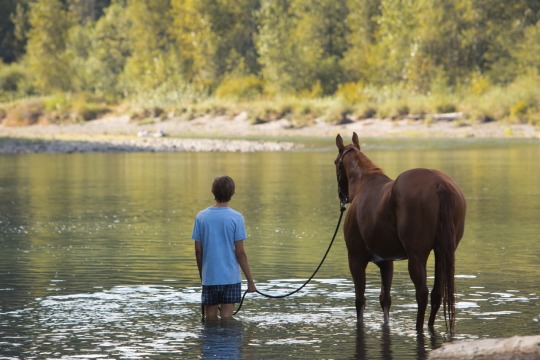
Andrew Haigh’s third feature sees the British filmmaker’s focus shift to the sumptuous expanse of rural middle America. In this touching story of a teenage boy and his attempts to save the eponymous also-ran racehorse, a delicate handle on the narrative complements stunning visuals to produce what should be the contradictory notion of an intimate epic.
It’s impossible not to fall for Charlie Plummer’s protagonist in the same fashion he has grown to love Lean On Pete, as the film’s central relationship reveals both boy and horse have equally been dealt a raw deal by their circumstances.
18. Happy New Year, Colin Burstead - (Ben Wheatley)
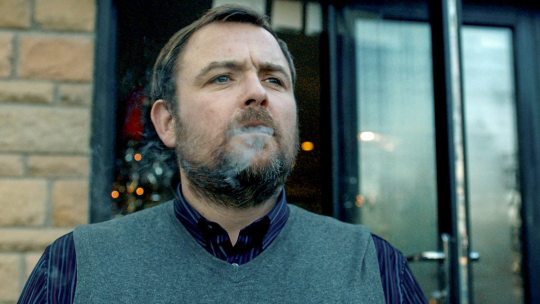
Ben Wheatley has emerged as an incredibly interesting and distinctive filmmaker over the past ten years, and that sense is only further heightened with the contained terror of the family gathering he portrays in Happy New Year, Colin Burstead. As an ensemble piece which takes place on the smallest of scales compared to High Rise and Free Fire, Wheatley’s latest was always going to live and die by its writing and acting.
Unsurprisingly, both are fantastic in a film that provides equal measures of comedy and unbearable discomfort for the audience. As an added bonus, it also includes easily the best end credits sequence of the year.
17. The Rider - (Chloe Zhao)
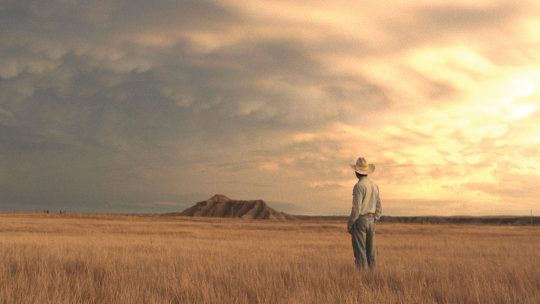
Chloe Zhao’s poetic, contemporary Western packs an abundance of heart-wrenching moments into a film that would stand as an extraordinary achievement even if it wasn’t for its real-life roots. As it is, this is more than just a film.
Although a slightly altered re-telling, the story of the Jandreau family and those who make up their social circle is brought to the screen by the real life figures in question. Zhao uses South Dakota’s largely untouched natural beauty as the canvas for this tale of struggle, and the search for purpose that unfolds from there isn’t easily forgotten.
16. You Were Never Really Here (Lynne Ramsay)
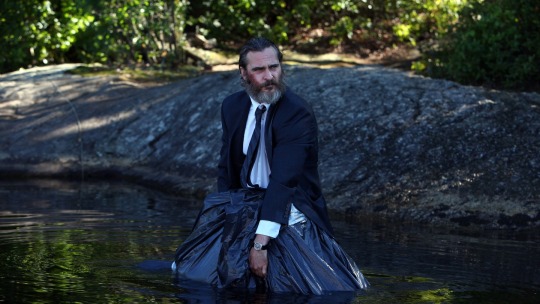
I’d be lying if I said that I liked You Were Never Really Here, which makes it something of a black sheep on a list of films that I otherwise loved across the course of the last 12 months. Some films aren’t supposed to be loved, though, and as Lynne Ramsay’s Taxi Driver-esque fable continues to rattle around my brain all these months later, I’ve come to appreciate it immensely.
This is a deeply unsettling film, but considering the subject matter, that’s exactly what it should be. Ramsay has delivered a film that showcases her masterful control of a very specific mood, and boosted by a stellar performance from Joaquin Phoenix, and Jonny Greenwood’s jolting score, it equated to one of the most memorable movies of the year.
15. Columbus - (Kogonada)
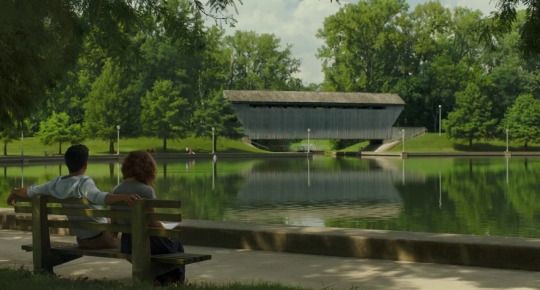
Swathes of cinephiles worldwide were already familiar with Kogonada’s cinematic tastes and sensibilities, thanks to his phenomenal video essays, but that didn’t make his feature directorial debut any less intriguing. In Columbus, Kogonada produced a film as considered as the architecture its characters swoon over.
There’s a stillness and a quiet to the film’s style and story structure, yet that doesn’t equate to a lack of heart or character depth. Haley Lu Richardson and John Cho’s sensational performances anchor the stunning visuals, ensuring their director’s own visual architecture never becomes something prosaic enough to overlook or simply pass by. This is close to as confident and assured as debut films can be.
14. Isle of Dogs - (Wes Anderson)

There’s no getting away from Wes Anderson’s particular tastes, tendencies and flourishes at this point in his career, and as a result, his work remains divisive. Having said that, as Anderson demonstrated in Fantastic Mr. Fox, animation offers an ideal medium for his ever exacting frame and the detail that populates his films. The result in this case is a visually stunning film with a wide range of charms, and something that’s undeniably its own thing in spite of the overt references to Akira Kurosawa and other Asian masters.
Beyond all of its artifice, Isle of Dogs possesses the kind of heart that critics often mourn the absence of in Anderson’s cinema. Anderson’s usual troupe of contributors also provide a fantastic voice cast, with the performances of Brian Cranston, Edward Norton, Bob Balaban, Bill Murray and Jeff Goldblum particularly lively as the film’s leading canines.
13. The Zen Diaries of Garry Shandling - (Judd Apatow)

Documentary portraits of famous figures don’t get much more complete or, indeed, interesting as Judd Apatow’s four-and-a-half hour love letter to the late Garry Shandling. Make no mistake, Apatow’s admiration for and closeness to his subject’s work is clearly evident throughout the film.
In spite of that, the film also manages to offer a look behind the curtain into Shandling’s personal life, and offer up an account of the toll that comedy and television can ultimately take on an individual. The film aligns itself with Shandling’s own clearly reflective instincts, and offers up a measured tribute which gives way to both laughs and tears.
12. The Miseducation of Cameron Post - (Desiree Akhavan)
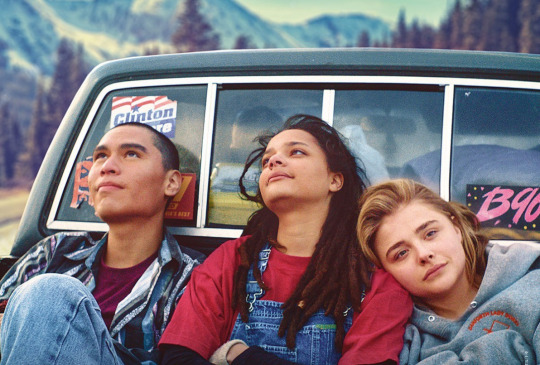
Desiree Akhavan’s second feature offers up a beautifully efficient and affecting exploration of burgeoning sexuality, and the struggles of wider society in coming to terms with that journey of sexual identity. In a year when multiple films took on a similar shape in exploring the archaic notion of gay conversion therapy centres (and on a very different subject but with a frequently similar shape, the restrictive setting of rehab facilities for addicted youth), Akhavan’s film is directed with a grace and subtlety that elevates it far beyond its contemporaries.
Chloe Grace Moretz and Sasha Lane enhance their deserved reputations as young, emerging superstars in a film that’s incredibly well-written, yet avoids the urge to rely solely on lengthy, overacted soliloquies. Instead, this is cinema as it should be. Trusting in the visual nature of the medium, Akhavan’s film is filled with lingering glances and shots, all of which reveal something about the characters and provoke further contemplation on the movie’s ever-important subject matter.
11. Widows - (Steve McQueen)

Steve McQueen’s background as a Turner Prize winning artist translated to a great sense of precision in his first three films. All three of those features, in some form or another, explored what happens when physicality is pushed to its limits, yet in Widows that same theme took on an even grittier quality when married with the conventions of heist films. A move into genre was undeniably a bold step for a filmmaker of McQueen’s style and growing reputation, but then again when he’s capable of playing with generic norms as impressively as he does in this case, it would have been a waste not to explore those possibilities.
Widows stands as a rich text layered with thoughtful assertions on class, race and gender roles, but that doesn’t detract from this story’s potential as pure entertainment either. With one of the casts of the year, the performances are exceptional across the board -- although Daniel Kaluuya’s work still stands out as one of the very best supporting turns of 2018 -- while McQueen’s inherent creativity is on display for all to see as he transforms a brief and simple car journey into one of the year’s most impressive, insightful and memorable shots.
10. Shoplifters - (Hirokazu Kore-eda)

Hirokazu Kore-eda’s tale of unconventional family on the social margins of Tokyo contains all of the trappings and warmth of Ozu’s best work, yet accompanies it with a distinctly modern and sharp edge that increases both its relevance and resonance. Deeply affecting throughout, Shoplifters highlights the often absurd nature of self-placed social constructs and norms, as just one element of a story that’s already wildly compelling, touching and urgent on its surface.
The question of nature versus nurture is very much alive and at work in Kore-eda’s film, but in a nuanced fashion that is perhaps even more interested in how society and class serve, and fail to serve, certain demographics as a whole. What’s best for us, and what can ultimately be most damaging, may be impossible to pinpoint until it’s often too late, and Kore-eda’s film is only too happy to conclude with that unknown sweeping over the audience.
9. First Man - (Damien Chazelle)
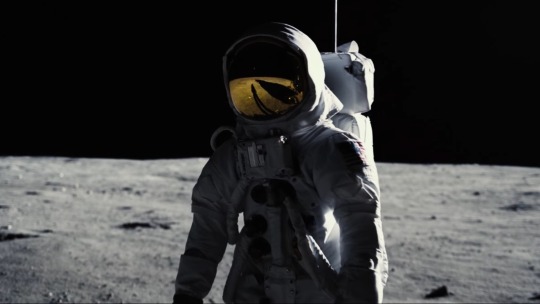
The very same elements that have led to much of the criticism of Damien Chazelle’s La La Land follow-up, will almost certainly prove to be the same reasons it will be afforded much deserved respect and acclaim in time. A very literal nuts and bolts re-telling of mankind’s greatest achievement, First Man is not all that interested in back-slapping or myth-building. It might be easier for many to imagine Neil Armstrong as an exuberant and deeply satisfied man, but his life was more complicated than that, and as such Ryan Gosling’s much-discussed, muted portrayal likely hit on the appropriate tone. Likewise, it would be nice to preserve a fairy tale image of NASA’s untouchable geniuses, but the film and the real life story is all the more interesting for wallowing in the toil, and incredible sacrifices of life, that were a part of man’s journey to the moon.
Having persevered through the quiet, rooted inner-workings and heartbreak that built up to the moon landing, Chazelle treats the audience to arguably the most spectacular moon sequence ever captured on film. The film ends having gifted a sense of wonder for Armstrong and his colleagues’ achievements, but understands the endless failures were just as central to that singular moment. Unlike much of Chazelle’s previous work, this film is not prepared to merely bow down to a narrative of genius.
8. Private Life - (Tamara Jenkins)
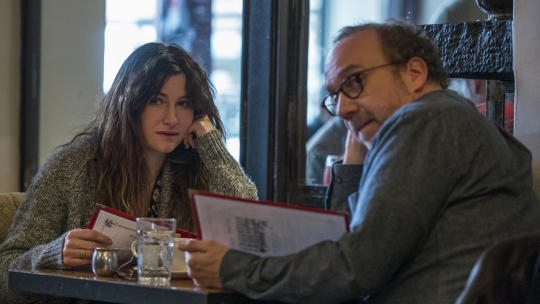
A masterclass in performance and writing from start to finish, Tamara Jenkins’ long overdue return to directing balances divergent tones throughout in a film that is jam-packed with humanity. Telling the story of a couple desperately trying everything within their power to have a child, Jenkins’ film runs through the full gamut of emotions, although it’s more than comfortable in spending prolonged spells on the extremes of uproariously hilarious and heartbreakingly crushing.
Kathryn Hahn and Paul Giamatti anchor the drama with great warmth and a genuinely believable love, while the supporting performances on the margins jump off the screen to provide no doubt as to the authenticity of this world. Private Life is the kind of intelligent and instantly relatable every day drama that rarely makes its way to the big screen any more. It’s also perhaps the strongest evidence in a long time for why cinema should be eager for these stories not to be consigned to the realm of TV drama.
7. Burning - (Lee Chang-dong)
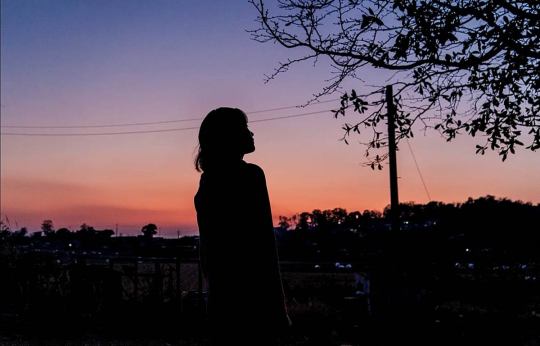
Burning is a mystery in every sense of the word. As a result, it arguably offers the purest dose of suspense that’s been seen on the big screen in quite some time. A sense of unease arises early in the film and only becomes more and more smothering as the action progresses. The lines are entirely blurred between the innocuous and ominous, and even by the film’s dramatic conclusion, for many they’ll remain equally unresolved.
In part, that’s the magic of Burning. It’s a film that not only drags the audience along with it on its journey, but displays a remarkable sense of confidence and control in doing so. The three leading performances in the film are spectacular, but Steven Yeun, in particular, is a revelation. Yeun’s Ben may be an incredibly sinister and manipulative villain, but it’s not a stretch to imagine his Gatsby-like figure being exactly who he presents himself as too. The film must be considered through the prism of the literary aspirations of its protagonist, Jong-su, and that creates valid suspicion. Regardless, Burning is an exquisitely crafted psychological drama and examination of social status along the Korean border, with equally stunning visuals to match.
6. Cold War - (Pawel Pawlikowski)

Inspired by his own parents’ love story, Pawel Pawlikowski took the intimate framing and crisp black and white of his Academy Award winning Ida, and applied it beautifully to a sweeping, European romance. Such is the power of cinema that Cold War feels truly epic. That’s all the more impressive considering it’s a deeply personal story captured in close quarters, which also zips in at a notably punchy 85-minute run time.
Combined with Lukasz Zal’s phenomenal cinematography, it’s clear that Pawlikowski has crafted a winning style. Still, the story is essential in providing the substance and, in this case, it’s thoroughly engrossing. Joanna Kulig is truly magnetic as the single-minded and enigmatic Zula, while Tomasz Kot carries himself with the effortless charisma and dignity of the archetypal, classic leading man as he embodies Wiktor. Every frame in the film would look at home in an art gallery, and yet Cold War carries memorable moments of substance beyond its aesthetic pleasures. Just as important to mention is the fact I never knew I needed Eastern European folk music in my life, and then this film’s enchanting songs took up permanent residence in my head.
5. Roma - (Alfonso Cuaron)

A true cinematic master, Alfonso Cuaron combined the bracing humanity of Y Tu Mamá También with the technical mastery of Children of Men to produce the most personal film of his career. In that regard, Roma may well live on to be viewed as Cuaron’s truly definitive work. This film captures the spirit that infuses his wider filmography with so much exuberance and life, while telling a story that has so much resonance in its own right.
A tribute to the childhood maid that raised him, Roma shines a light on the struggles of indigenous Mexican people, and the class and cultural divides that have long existed in Mexico City. Driven by an outstanding, naturalistic performance from first-time actress Yalitza Aparicio as Cleo, the film’s deliberate pacing provides the audience with the truest sense of the world in which its set, and the routines of its protagonist. Of course, it does this in a fashion which few other living filmmakers could dream of replicating. Cuaron’s camerawork is out of this world, particularly in the film’s two main set pieces, but just as relevant to the discussion that surrounded its Netflix release was the remarkably immersive sound design. I was lucky enough to catch Roma on the big screen, and there’s no doubt that it made the film an even greater cinematic spectacle. Having said that, the emotion at the heart of the film is deeply affecting, and it will therefore connect on screens of all shapes and sizes for decades to come.
4. If Beale Street Could Talk - (Barry Jenkins)
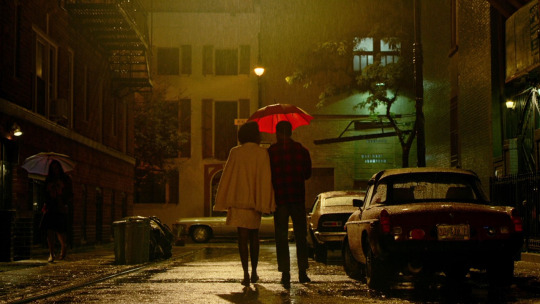
If Beale Street Could Talk is not only Barry Jenkins’ first film since his Oscar win for Moonlight, but it’s also the first English-language adaptation of a James Baldwin work. Combined, those elements make for an enormous weight of pressure and expectation, and yet Jenkins was more than up to the challenge of delivering beyond even the loftiest of expectations. Much like Moonlight, this is a perfect match of filmmaker and subject matter. Jenkins is undeniably ascending toward the status of being the premier cinematic chronicler of the African American experience. It’s particularly vital for that specific lens to his work to never be overlooked, either, as it gets right to the heart of the essential truths of his films.
Still, it all derives from a deeper understanding of emotion, society and relationships that ensure Jenkins’ cinema is also imbued with a layer of universality. Jenkins is a filmmaker of great empathy, and his collaborations with cinematographer James Laxton have seen him develop into the modern master of the close-up. Faces have rarely looked as rich and expressive as they do under Jenkins’ gaze, and it’s likely no coincidence that actors seem to find another gear for their performances under his watch. For this film, those elements all combine for a story rich with romance and tragedy, and one that’s sadly as relevant today as it was when Baldwin published the novel in 1974. To cap things off, Nicholas Britell’s score finds the most extraordinary balance between soaring romance and Herrmann-esque dread to emerge as cinema’s best soundtrack of the year.
3. Leave No Trace - (Debra Granik)
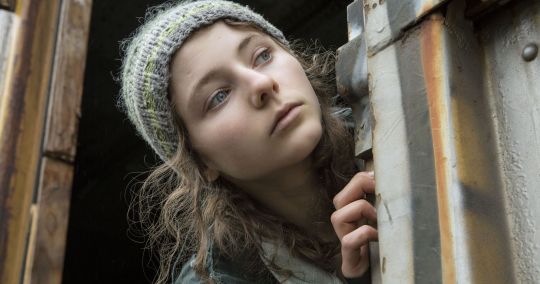
Debra Granik returns with her first feature since Winter’s Bone effectively launched Jennifer Lawrence’s career, and it was undoubtedly worth the wait. A quiet film with an ultimately pointed and heartbreaking message, Leave No Trace affords the leafy green environs of the Pacific Northwest the kind of breathing space society seems so unwilling to offer the film’s father and daughter duo.
Played by Ben Foster and Thomasin McKenzie respectively, there’s an arresting resilience and tenderness to the central relationship of Will and Tom. Living in public parks and deserted woodlands, Will and Tom don’t conform to the cut and dry definitions of family and home that the authorities around them are intent on enforcing upon them. Part of the magic of Granik’s film comes in the way it gradually channels the viewer to see things from their perspective. Why can’t contented people, doing no harm to others, be allowed to live in a manner of their choosing? Of course, the conversation is much more complex of that, and so, as Granik’s film ultimately reveals, is the telling of it in this case. On the whole, Leave No Trace is a truly mesmeric meditation on the impact of trauma, familial love and societal norms. Buoyed by McKenzie, who delivers one of the most astonishing performances of the year, it’s not a film that can be easily forgotten.
2. Minding the Gap - (Bing Liu)

It’s become unsurprisingly fashionable for American cinema to attempt to explain the ascendance of Trump, and the country’s wider social challenges, with on the nose films that offer minimal real depth or insight. Minding the Gap doesn’t fall into those same traps, though, largely because it seems like it never originally had aspirations to be as profound as it ultimately proved to be. As it turns out, simply charting the lives of a group of skateboarding friends over an extended period of time provides a fascinating look into the struggles of youth, and the baggage of history and circumstance, in small, forgotten towns.
Directed by Bing Liu, one of the aforementioned skateboarders, Minding the Gap’s subject matter ultimately proves to be remarkably complex and far-reaching for a 93-minute documentary set on the streets and in the homes of Rockford, Illinois. The young men’s interconnected lives ultimately give way to a shared history of previously undiscussed struggles. Among the young men’s commonalities are exposure to domestic abuse, experiences shaped by race, immense financial struggle, the confusion of modern masculinity, and, of course, a passion for skateboarding. There’s certainly some optimism to be found here, but there’s also an overwhelming sense of sadness for how these young men have been shaped by past acts and histories that were always beyond their control. If you wanted to even try to explain America in 2019, understanding those challenges would be essential. In truth, though, the same difficulties could be applied, and used as explainers for social issues, across the wider Western world. This is a deeply human story and, I’d argue, the year’s most touching film.
1. First Reformed - (Paul Schrader)
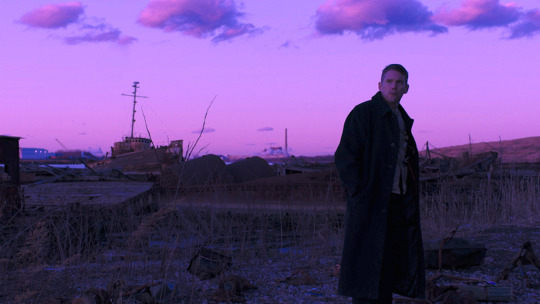
I’m not sure how many people were expecting it, but at 72-years-old, Paul Schrader remains one of cinema’s most vital and striking voices. With a deep well of cinematic knowledge to draw from, First Reformed sees Schrader borrow liberally from many of the form’s great masters, while still crafting an incredible story that is undeniably spoken in his own abrasive tone. Bergman’s Winter Light, Dreyer’s Ordet and Bresson’s Diary of a Country Priest are blatantly obvious inspirations, but the voice of Taxi Driver’s Travis Bickle, Schrader’s own most famous creation, is equally present in the character of Reverend Ernst Toller.
Toller is played masterfully by Ethan Hawke in the best performance of what’s already been a rich and fascinating career. A clearly measured and reasonable man, Toller’s journey ultimately brings him to breaking point as those around him ignore his message in the same way that he attempts to turn a blind eye to his ailing health. Schrader’s writing tackles global warming, and the prospect of impending doom that accompanies it, in the kind of blunt and unflinching terms that should now be unavoidable but tragically remains all too rare. By the same token, as Toller begs for consideration of whether God can forgive for the damage done to the earth, his preachings fall on the deaf ears of an immensely selfish world. In Schrader’s mind, there’s no question that drastic times call for drastic measures.
Even with such an urgent message, a fantastic script, and a generational lead performance, First Reformed wouldn’t be as great as it is without its stunning array of visuals. The film’s visual treats range from extreme close-ups that make a map out of Hawke’s wrinkled forehead, to the electric and lustrous pink of Toller’s heartburn medicine as it mixes with his whiskey, and to the vivid anger of the early morning sky. Quite simply, it’s a feast for the eyes, a jolt for the mind, and an assault on the soul.
#film#movies#cinema#oscars#first reformed#minding the gap#leave no trace#if beale street could talk#roma#cold war#burning#first man#shoplifters#private life#widows#the miseducation of cameron post#the zen diaries of garry shandling#isle of dogs#columbus#you were never really here#the rider#lean on pete#happy new year colin burstead#a star is born
1 note
·
View note
Text
Epic Movie (Re)Watch #242 - Paul (2011)
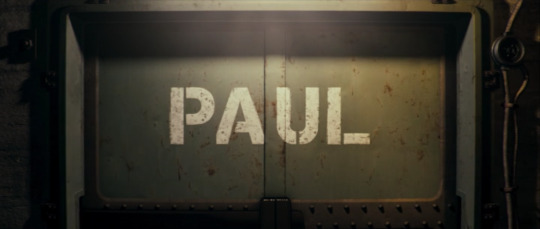
Spoilers Below
Have I seen it before: Yes
Did I like it then: Yes.
Do I remember it: Yes.
Did I see it in theaters: No.
Format: Blu-ray
1) The prologue for this movie is particularly strong. For one thing, the name of the dog, “Paul,” stands out. It’s hard to watch this movie without knowing the title. And it shows that the film isn’t just making fun of sci-fi but playing in the genre. There’s a nice sense of atmosphere to the short prologue and it poses many interesting questions. Namely: what the hell just crashed on earth?
2) I appreciate how earnest Simon Pegg and Nick Frost come across as nerds in the movie. So often people who are enthusiastic about pop culture are portrayed as the joke, their existence is a joke. But with Graeme and Clive yes they can be funny but the joke isn’t the simple idea of, “Look at how funny the nerds are!”
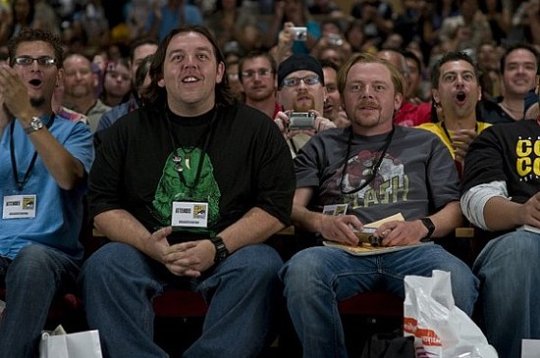
3) Another line of humor I appreciate in the film is that while Graeme and Clive are often mistaken to be a couple, they’re never really uncomfortable with people thinking they’re gay unless they are in a situation with some homophobic assholes. And in that case the discomfort isn’t the threat to their masculinity but the threat to their safety. It’s a nice distinction from how these types of storylines typically go.
4) Look, do I even need to talk about the on screen chemistry between Simon Pegg and Nick Frost? They have proved it countless times across film and television. They’re a legendary on screen duo. Abbott & Costello, Fred & Ginger, Gene Wilder & Richard Pryor, now Simon Pegg & Nick Frost. They’re great together always, even when the films may be a little less than stellar they are not. And Paul is no exception. Their chemistry is on point, they’re as strong alone as they are together, it just works. We spend enough time with their characters before Paul shows up that we clearly understand the relationship, something which is not only the result of strong writing but strong acting as well.
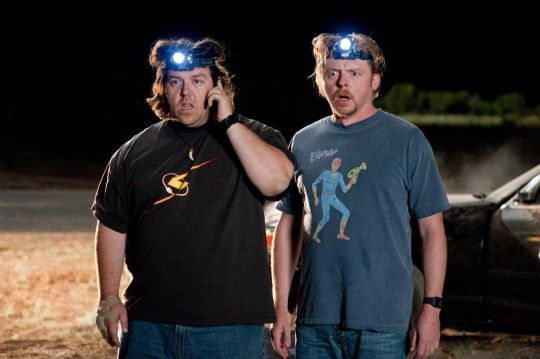
5) The waitress played by Jane Lynch is wonderfully supportive of the duo’s nerdy nature. She doesn’t make fun of them for their interests, she doesn’t see it as odd. She encourages it! And even when the two jackasses show up she’s supportive and only suggests they leave because she knows the bearded truckers could start trouble. I really like that.
6) Seth Rogen as Paul.
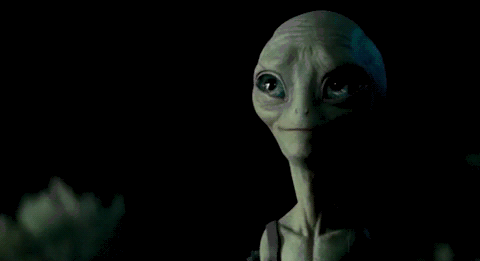
Being the titular character of a movie carries a to of weight with it. You have to be the most memorable part of the movie. Think of Beetlejuice, for example. That’s a lot to live up to. Our intro to Paul shows off much of his character and his down to earth nature (no pun intended). We get introduced to his crude and profane language, his sense of humor, and even a little bit of his heart. It is the latter of these things which helps make Paul a character and not just a gag. You understand his intentions, what he wants, what motivates him, and you can relate. It’s a bit of E.T., actually. He just wants to go home. We get to especially see this when interacting with Blythe Danner’s character later in the film, how vulnerable he allows himself to be and how he grows to care about the safety of others.
Seth Rogen nails it as the character. Rogen is no stranger to voice over work and sometimes I honestly forget I’m listening to him. This isn’t because he does anything particularly tricky to disguise his voice, but just because it fits all the above mentioned characteristics of the alien so well. It just works and I think the film is better for Rogen’s casting.
7) Jason Bateman as Agent Zoyle is a fun addition to the movie. Bateman plays the character as reserved and intensely focused, a straight man to some of his more chaotic counterparts. That’s where most of the humor comes from and Bateman’s precision with the role only benefits it.

8) Joe Lo Truglio and Bill Hader have a fun chemistry in this film and add a nice amount of life to the movie. They have fun with their characters and each other making it all the more fun to watch.

9) This film is just dripping with references to great sci-fi films, some subtle and some not so subtle.
Paul [asking for food at a gas station]: “Hey! Reese’s Pieces!”

10) Chekov’s dead bird.
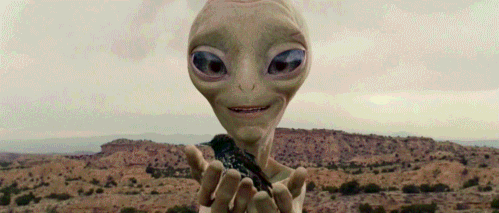
(GIF source unknown [if this is your GIF please let me know].)
Paul showcasing his ability to heal things, even partially, sets up an important alien power of his that also leads to a great gag with his little snack.
11) The film does well with giving each character their own personality and arc. Bill Hader’s character specifically gets a well written storyline of drive and upward mobility. Not everyone would think to give him that storyline.
12) I like Paul’s planet.
Paul: “Everyone’s bi on my planet.”
13) I’m a sucker for these kinds of jokes. Specifically, how Paul was SUCH an influence on pop culture. That the stereotypical alien look came from his face so people wouldn’t freak out so much when they saw him, that he talked to Steven Spielberg (who does a voice over cameo as himself) about E.T., or that, “Agent Mulder was my idea!” I dig it.
14) Kristen Wiig as Ruth.
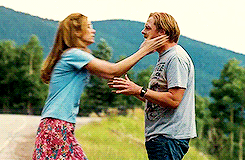
Wiig is charming and sweet in her portrayal of Ruth. She’s a nice addition to the film and is able to hold her own against the chemistry between Pegg and Frost. She doesn’t feel out of place or tacked on, even getting a really great arc of her own (scientific?) awakening. I appreciate that.
15) On a more personal note, I disagree with the idea that there has to be this complete divide between religion and science as the film largely presents it. You’re either one or the other which to me doesn’t make a ton of sense. Not to get too into my own personal beliefs but I believe in the idea of a creator behind the universe but that doesn’t undermine things like evolution or the big bang or anything else. But I think I’m getting off track.
16) There are some surprisingly strong action scenes in the movie. Often comedy that fall into a subgenre like sci-fi or fantasy rely heavily more on the comedy then set pieces. There’s nothing wrong with that if pulled off well, I just always forget that Paul has a number of well paced chase and action sequences too.
17) I like that the film takes time to develop the relationships with Clive and Paul as well as Graeme and Ruth. They fell organic, natural, and they’re not static either they grow and change. I like it.

18) It took me a while to understand this joke because I didn’t know what Mac & Me was.
Clive: Ever since I saw Mac and Me, I've dreamed about meeting you!
For those who don’t know, Mac and Me is basically an ET rip-off that is often listed as one of the worst films ever made that some see more as a commercial for McDonald’s and Coca Cola than a film.
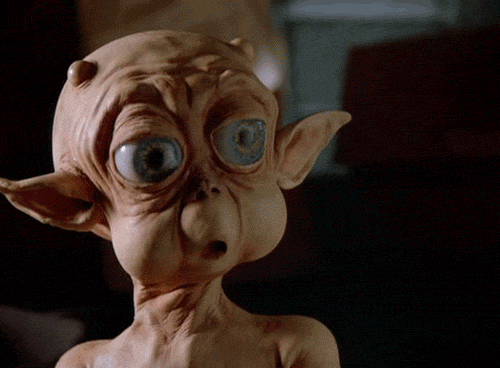
Also that thing is creepy as hell.
19) Ruth trying out profanity throughout the course of the movie is fun to watch and actually, now that I think about it, mirrors my own attempts with cursing as a kid.
youtube
20) At its core, Paul is a fun road trip movie. It’s about going somewhere but it’s also about the journey. The trouble you face on the road and the friends you have to see you through it. It just also involves aliens and the government.
21) The country bar version of “Cantina Band” is nice.
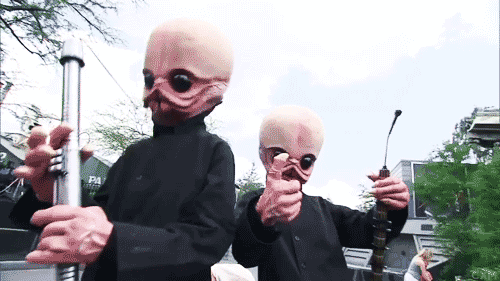
22) I think the bar scene works because it’s basically the eye of the shitstorm. Everything the group has been running from - the truckers, Ruth’s dad, the government - all converges upon them at the same time. It makes for a fun and ripe conflict that’s interesting to see the characters deal with.
23) Is this some sort of crack about Bob Dylan’s current music not “measuring up” to his early stuff or whatever?
Paul [about his drugs]: It's pretty strong shit. I get it from the military. I think this is the stuff that killed Dylan.
Graeme: Bob Dylan’s not dead.
Paul: Isn’t he?
24) Random Keith Nash is random but nice.

25) Blythe Danner as Tara is a nice late addition to the film. Danner puts a lot of heart and soul into what is essentially a tragic character. A space alien landed on her dog, was taken away by the government, and she was dubbed a freak by society only for telling the truth, something which required years of therapy. But Tara’s no push over. Danner is able to make her strong, tough, and pretty funny when the opportunity arises.
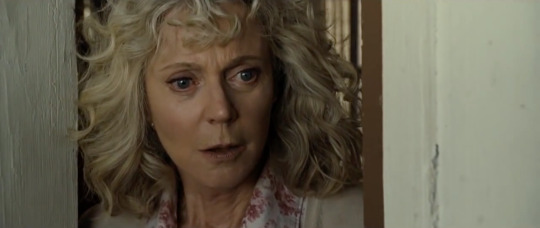
26) The whole scene where the group has to escape the feds at the farm is the film’s best action sequence. It is incredibly well choreographed, tightly paced, and there is a wonderful escalation of insanity and action as the scene progresses. I really like it.
youtube
27) This film is Wilhelm Scream certified.
28) The movie is basically a big love letter to sci-fi movies created by the likes of Steven Spielberg and George Lucas. The previous mention of Reese’s Pieces, the fact that the mountain from Close Encounters of the Third Kind is where Paul goes to phone home, and the line from Jason Bateman, “Boring conversation anyway,” mirroring Harrison Ford’s line from the original Star Wars. It shows not only just how much those kinds of films meant to the filmmakers but also how important it is they express that love in cinema. I think honesty admiration always leads to great filmmaking.

29) Sigoruney Weaver’s role as The Big Guy is basically a glorified cameo but I love it. Her casting is pitch perfect. As soon as she actually shows up you know shit just got real. Why? Because it’s Sigourney Weaver! It’s Ellen Ripley for crying out love. She just commands the scene and the fact that the oft mentioned “big gun” from earlier in the film is literally just a big ass gun is great.
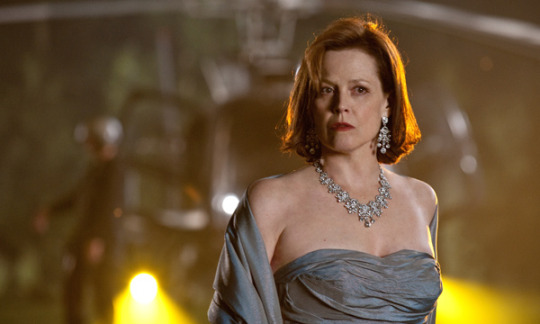
30) The twist that Zoyle is actually on Paul’s side totally surprised me the first time I saw the film but it adds a lot of rewatch value. It totally makes sense in a second viewing and helps deepen his character from more than just a standard gov antagonist.
31)
Zoyle: “Call me Lorenzo.”
Clive & Graeme: “Lorenzo Zoyle?”
I did not understand this reference at all when I first saw the movie. I had to google it extensively. Apparently it’s a reference to the 1992 George Miller directed film Lorenzo’s Oil that’s a family drama about a sick kid and has nothing to do with sci-fi. So after I learned what the reference was I googled some more to figure out why it was a joke in the movie. Apparently it was Nick Frost’s idea.
“It’s just one of those things that I kind of like doing, that thing that you take one letter from the surname and add it to the forename and it becomes something completely different. It’s possible someone could be called Lorenzo Zoil.” (source)
32) Graeme’s “death” actually packed a punch with me watching this. You kind of figure he’ll survive, I mean we’ve seen Paul use his healing ability before, but still I think that it does pull at your heart strings speaks to how well the film does in making you care about these characters and their relationships.
33) THE SHIP FUCKING LANDS ON SIGOURNEY WEAVER AND THAT’S HOW SHE DIES! YES! I LOVE IT!
34) I really like the in-credits epilogue. Like, the ship taking off slowly is a good final gag and leads to the emotional finale of the film. But the in-credits epilogue ties up some loose narrative strings and feels a bit more finite than just everyone standing in the now empty field. I dig it.
Paul is a lot of fun. It’s not really the same level of genre comedy as the Cornetto Trilogy per say, but why even make that comparison? I only mention that because I heard someone at work saying this movie sucked because it wasn’t Hot Fuzz and I was like, “That’s your criteria?” It is a charming, earnest, fun, well acted, and enthusiastic comedy. It’s a good time with lots of great gags and character moments. I like it and hopefully you will too.
#Paul#Simon Pegg#Nick Frost#Kristen Wiig#Paul 2011#Jason Bateman#Sigourney Weaver#Joe Lo Truglio#Bill Hader#Epic Movie (Re)Watch#Blythe Danner#The More You Know#Movie#Film
10 notes
·
View notes
Text
I’ve been kinda bitter about the whole pride on D*sn*y+ thing and how its not only barren but taking credit for representation that D*sney themselves repressed in the first place, so here’s how I would’ve handled it if i were the CEO of D*sn*y:
A foreword for the front page of the Pride watch list:
This June, we want to celebrate the lives and love of LGBTQ+ with you and use our platform to share your inspirational stories, as well as inspire you to love and be yourself. However, we also recognize that we have a lot of work to do regarding our content and its inclusivity. We have already stated that we wish to reflect the world as it is while moving forward with our content, and we want to make sure this includes the beautiful lives of the LGBTQ+ community in the future. For the time being, we would like to cement this promise to you by making this pride themed watchlist. Each piece of content was selected based on the opinions and enthusiasm of our wonderful and precious LGBTQ+ staff members. For the rest of June, each piece of media in this watch list will be preceded by either a foreword, an interview, or a montage of voices which illuminate it’s value to the community, the work that members of the community have put into it, or, in situations wherein your voices were lost, a spotlight on what the media should have said about the community. We also take immense delight in seeing our media claimed by the community whether representation was intended or not, because representation matters and we encourage you to celebrate your pride wherever you find yourself.
(In a literal sense, if i were the CEO i would own up more directly to the company’s “mistakes”, but i was supposing they’d wanna sprinkle a bunch of PR pixie dust all over it so i used less guilty language than i would have liked to lol)
The watchlist according to me (does not include content I haven’t seen/am not familiar with, I’m sorry if your favorite is missing it’s just cuz I haven’t seen it;;):
-Frozen. Yes, I want this on the front page cuz it would be damn powerful to list their #1 animated movie of all time FIRST. Preceded by a montage of various LGBTQ+ fans celebrating the film in their own proud way. You fuckos are gonna fucking acknowledge just how much else and let it go spoke to the community after almost 10 years whether u like it or not.
-Luca. Preceded by a montage of Proud folk who were inspired by the film and the filmmaker’s TRUE vision for it goddamn it.
-Star Wars. Same reason as Frozen but it’s preceded by an interview with John Boyega and Oscar Isaac about the downplayed romantic relationship between Finn and Poe.
-High School Musical (the actual original movies 1-3) preceded by interviews with Corbin Bleu and Lucas Grabeel regarding Chad and Ryan’s relationship and how it truly existed in their minds.
-Every Disney Princess film that was influenced by Howard Ashman preceded by interviews from every living person who worked with him on these films to highlight who he was and what stories he wanted to tell with these works. Yes, these stories spoke to LGBTQ+ in a sincere way long before whichever executive it was that decided to make Lefou gay for Gaston.
-Turning Red. Every wlw who relates to this movie deserves to speak on it, and while we’re here, please do another behind the scenes video about it that doesn’t pretend the panda was just a puberty metaphor to simplify it for white audiences, please i beg of you.
-The Owl House.
-Amphibia!
-Gravity Falls with a blunt preceding interview with Alex Hirsch about every single instance in which he attempted to include LGBTQ+ representation only to be told no, by none other than D*SN*Y themselves lol.
-Star vs the Forces of Evil (i never finished the series but i know shit was censored so it’s time to bring that to light).
-And hey, since we own everything on Fox now, let’s include Bob’s Burgers and even the Simpsons! They aren’t perfect but they at least made significant efforts over the years unlike some mouse-eared executives.
-i was gonna insist they include onward and the beauty and the beast remake with preceding interviews about how they recognize their mistakes now, but maybe it’s best to not bother lol INSTEAD let’s just have a nice featurette where these movies among many others come up as examples of mistakes and missteps that the mouse seeks to rectify and improve on 8).
-I guess they can also feel free to include whatever other legitimate things they had listed in their real pride watchlist, tho i would prefer it if Glee wasn’t at the top and that it had like a biiiiiig forewording about all the flaws in it that range from cringe to damaging and maybe they can include pop ups throughout the whole thing about how they could’ve done better in any given scene lol
-Also Mulan (the animated one that wasnt pandering to a corrupt government) cuz bisexuality and gender queer representation fucking matters bless lol
(If u actually read my rambles and have any other suggestions feel free to shout em out)
#catext#if only i had the power to make it canon that monsters inc was about sully and his tragic devotion to a forever closeted bi monster#as well as the power to make a third monsters movie where mike does actually choose the mlm happy ending~
1 note
·
View note